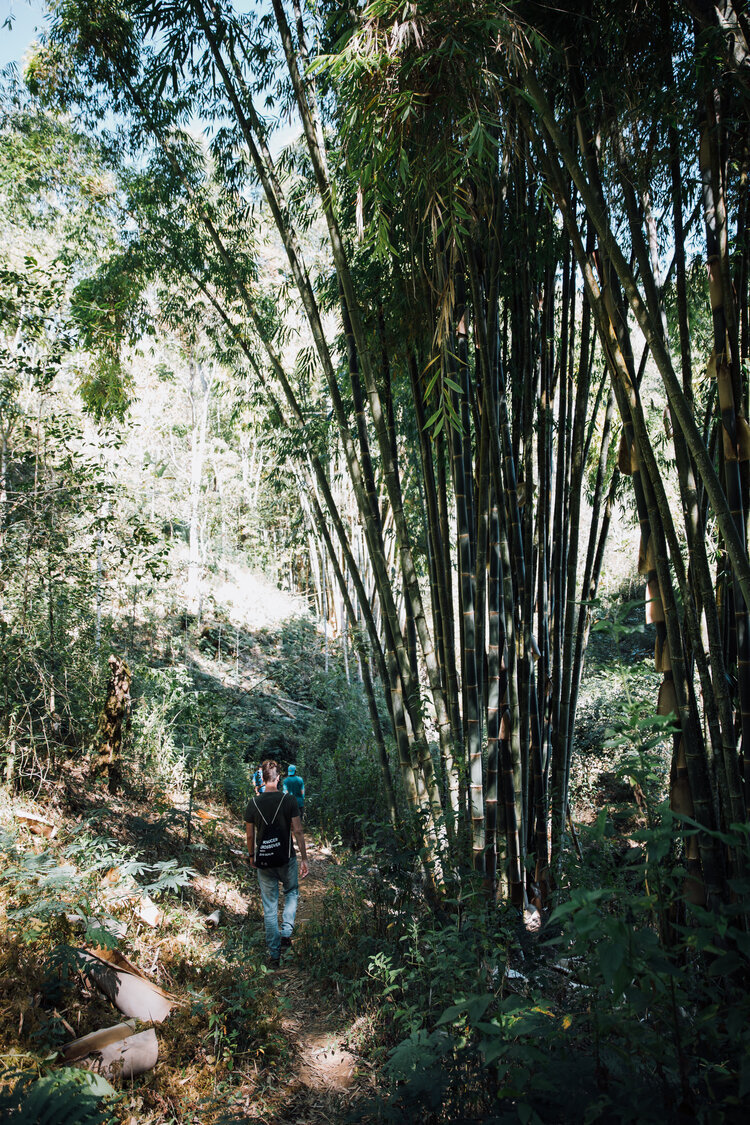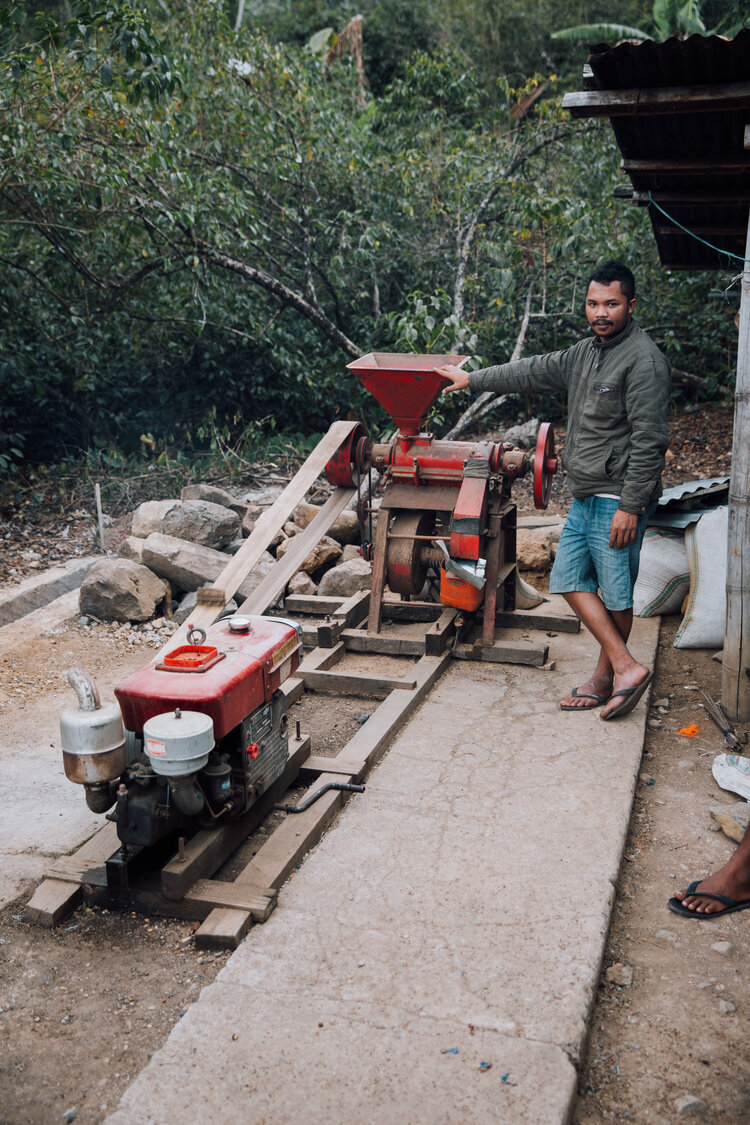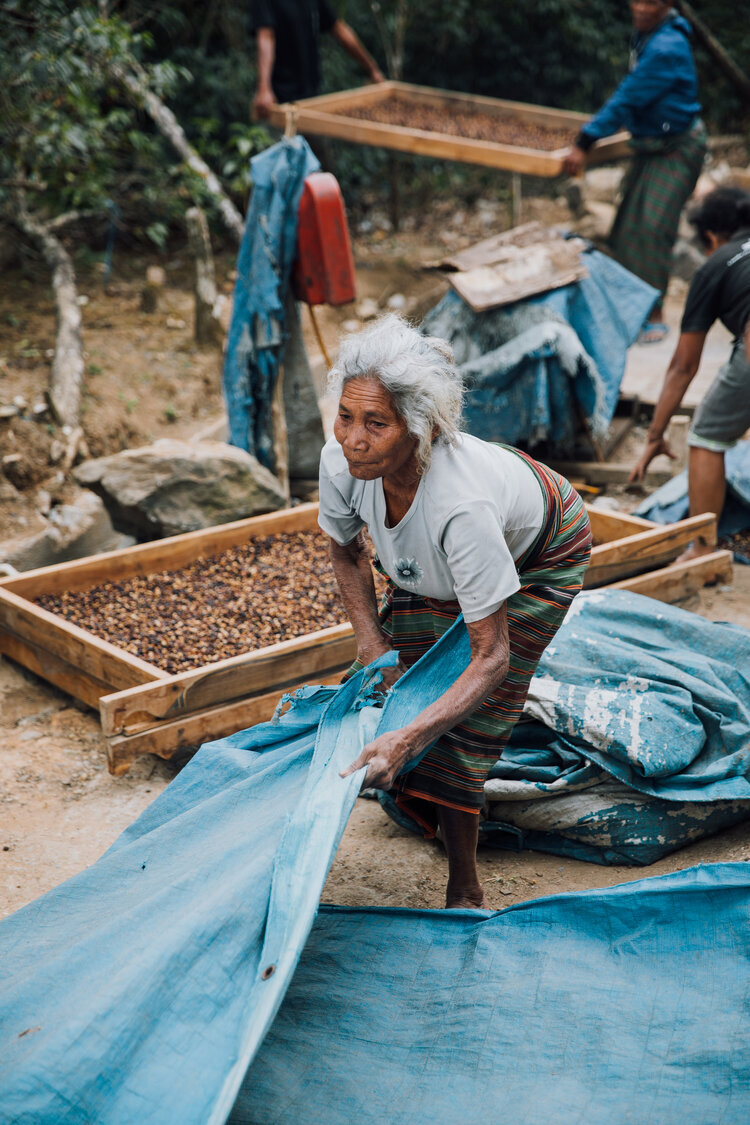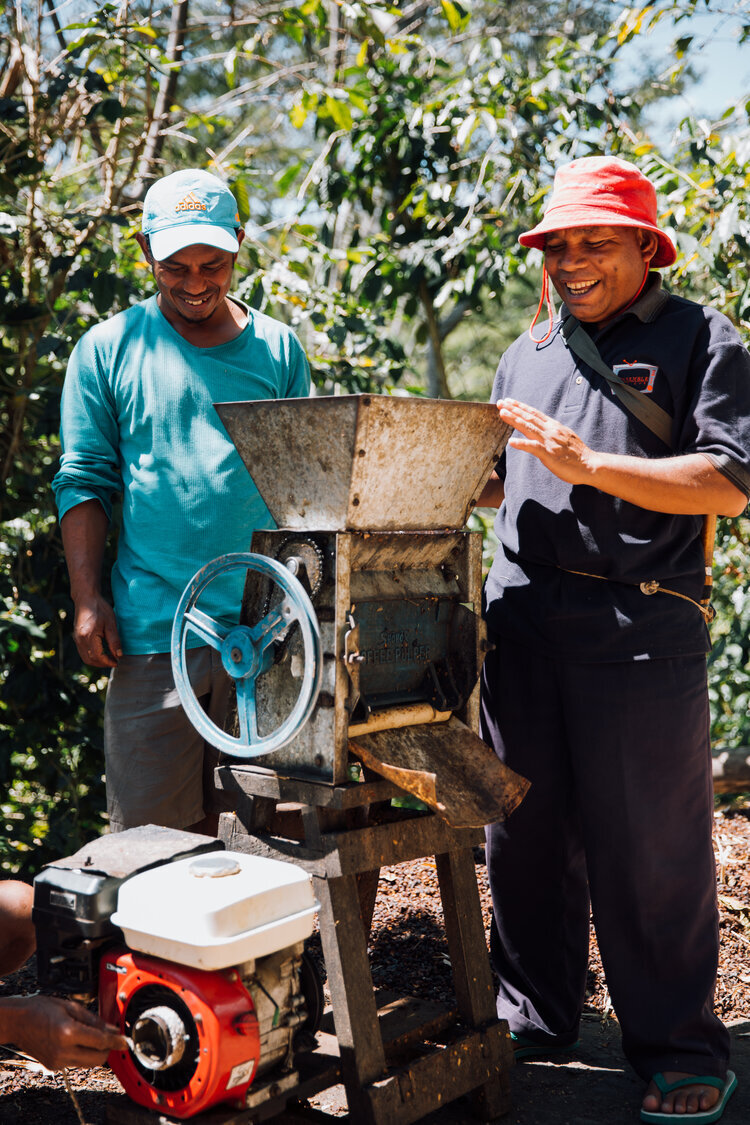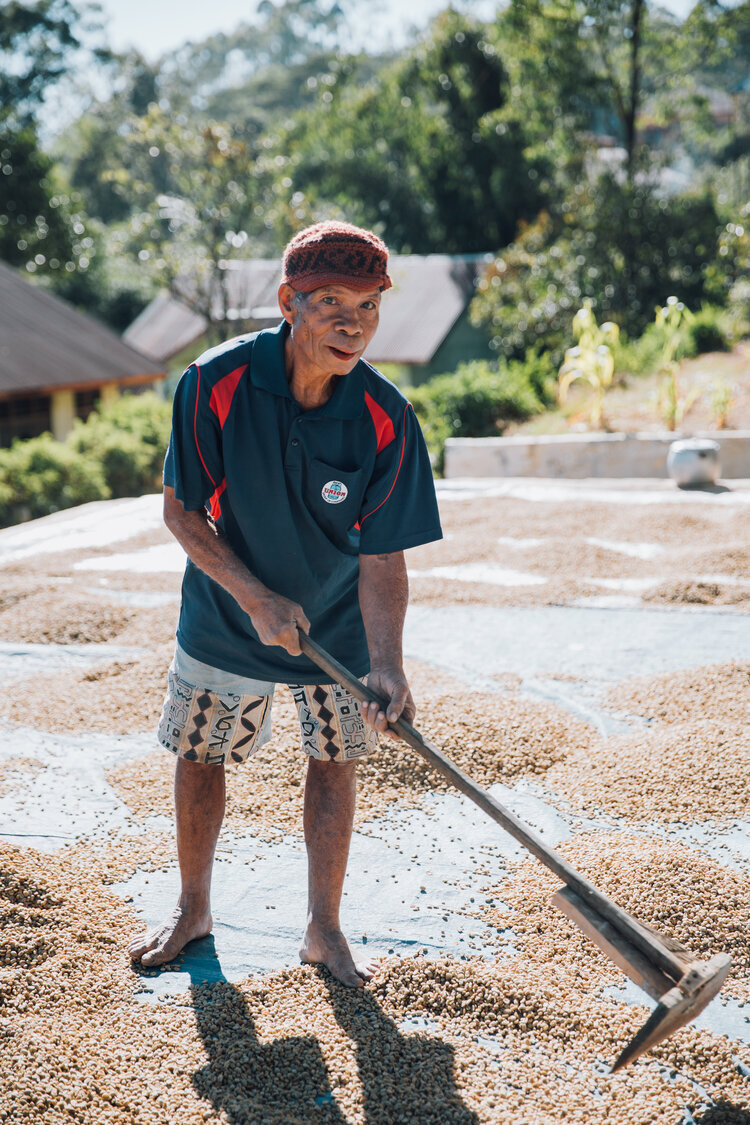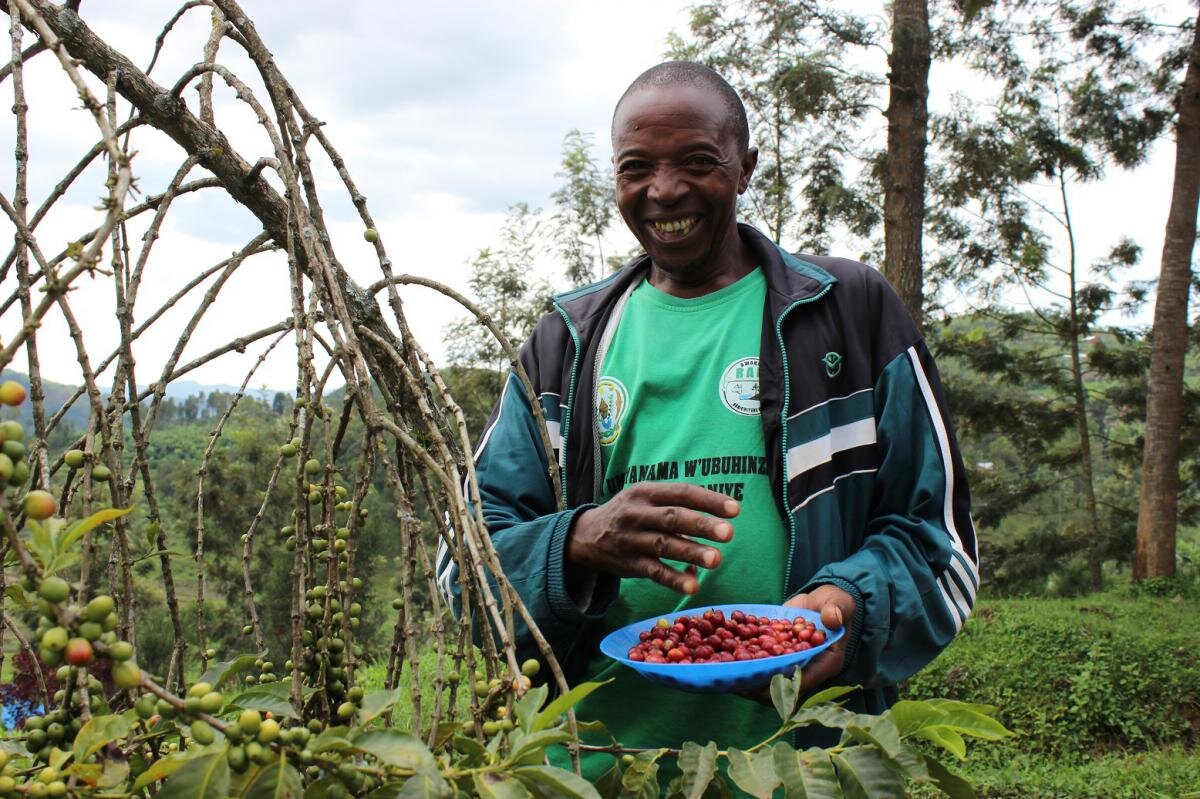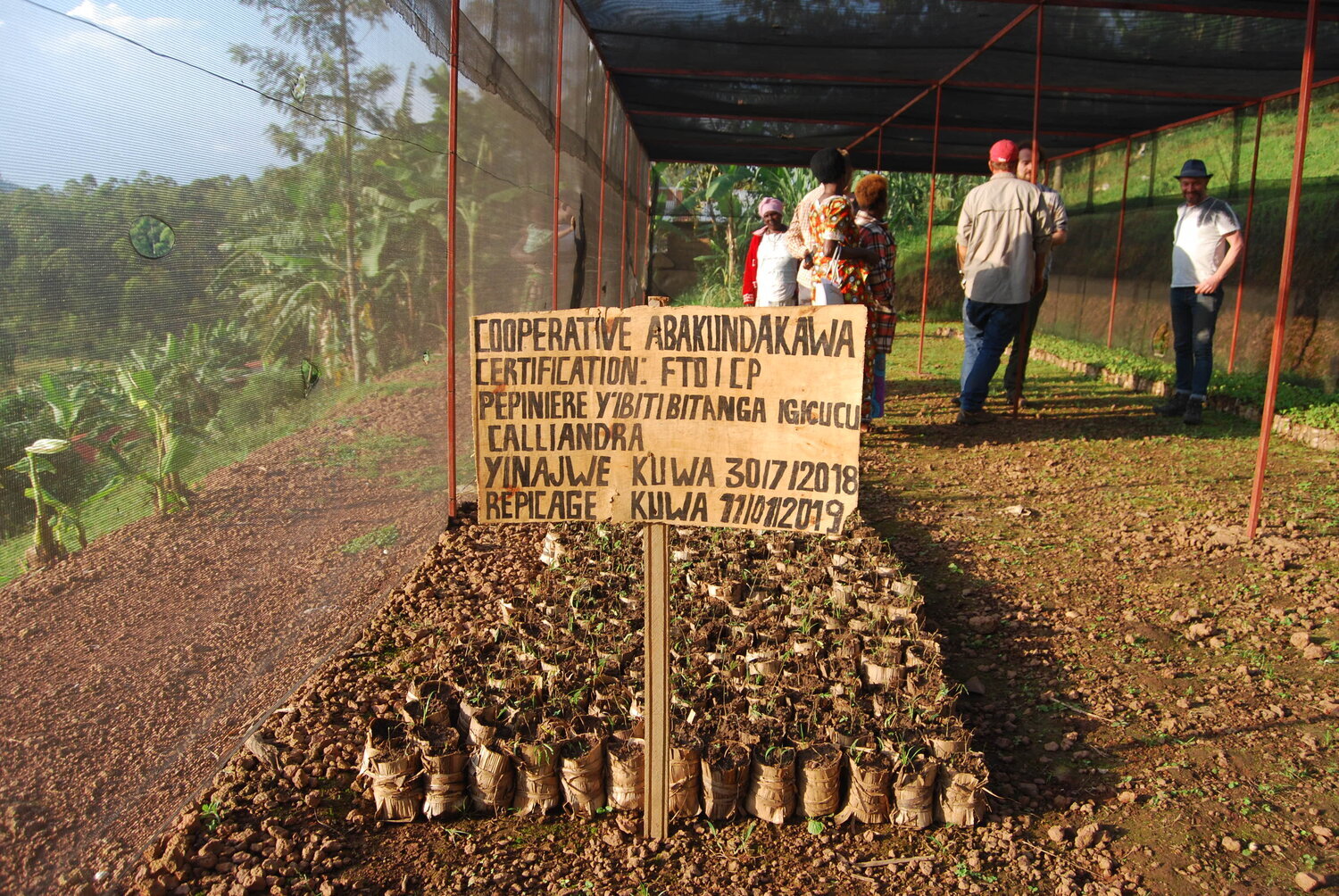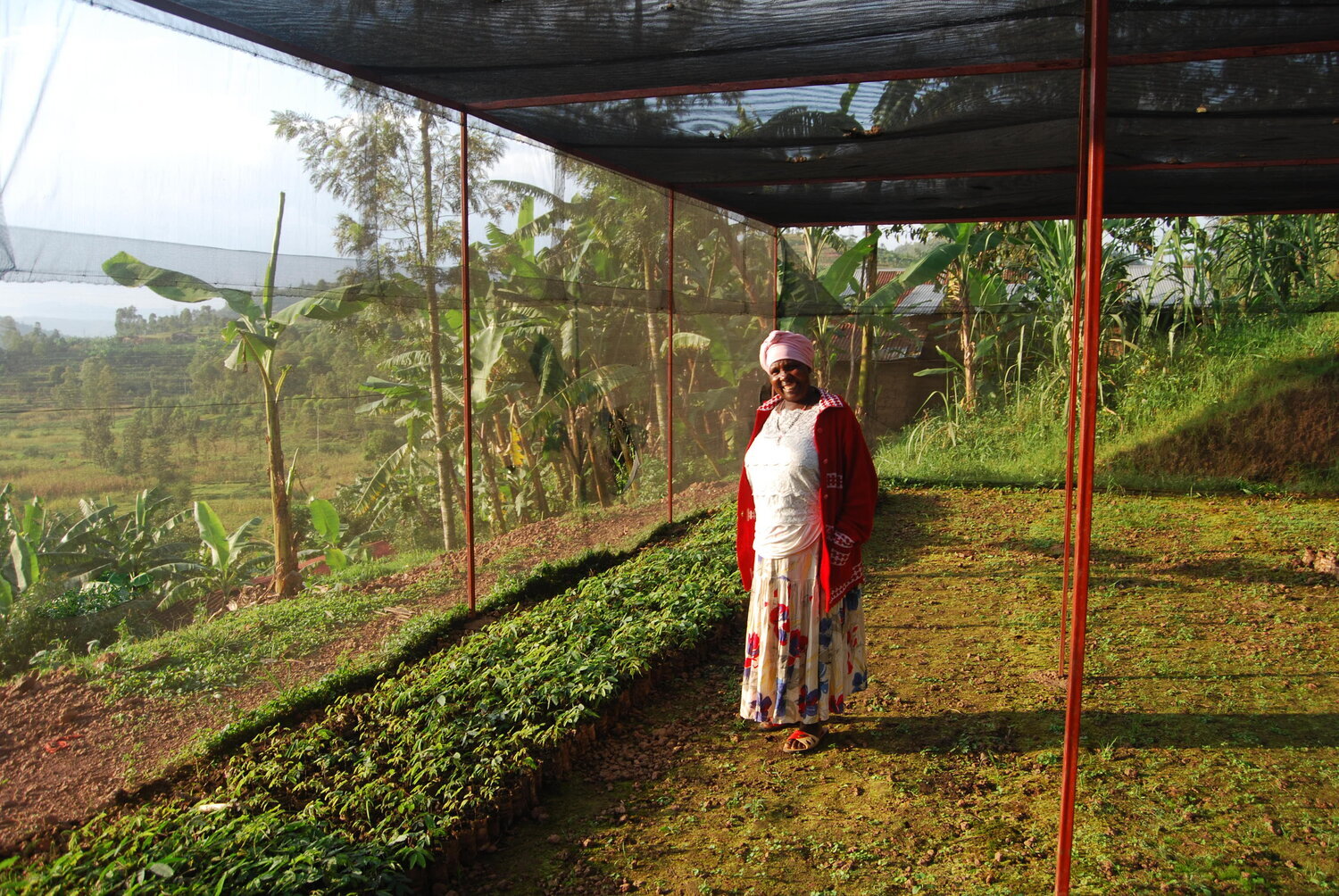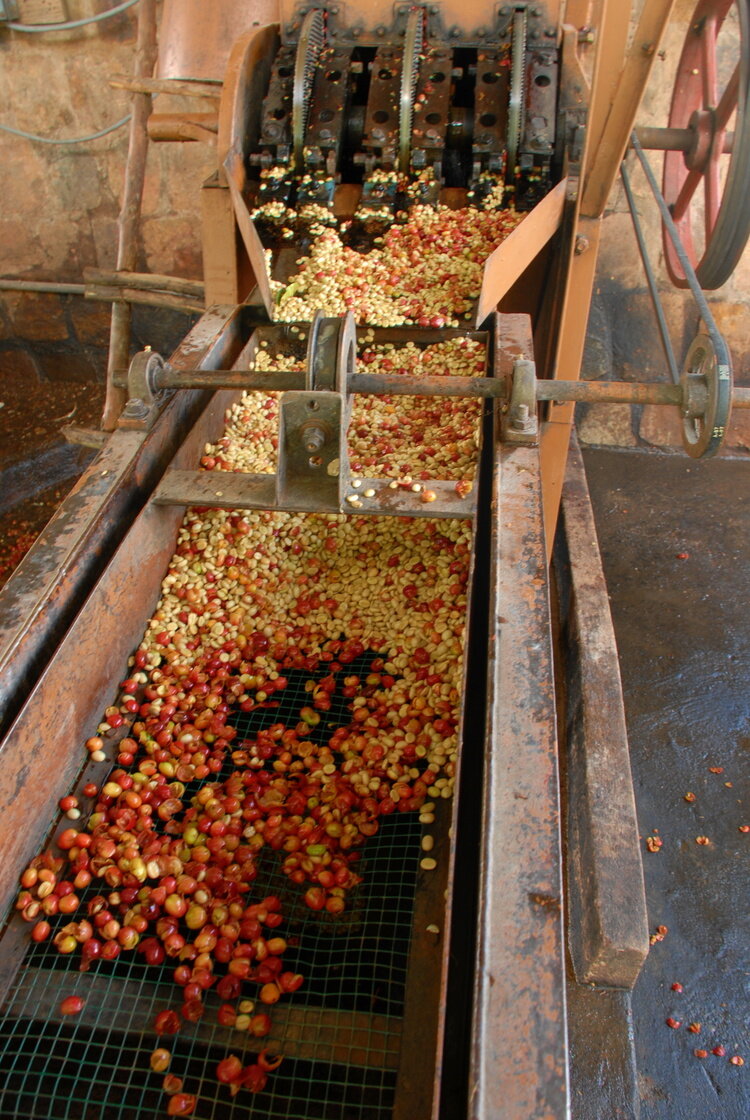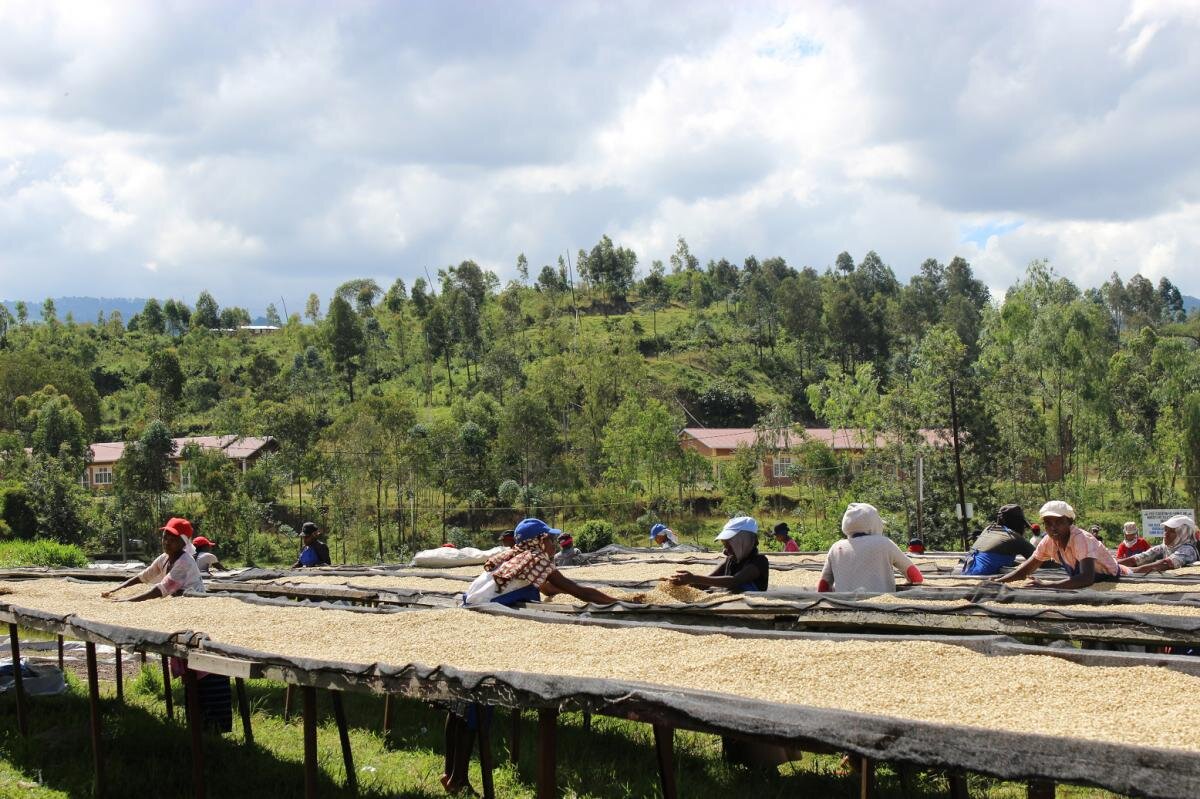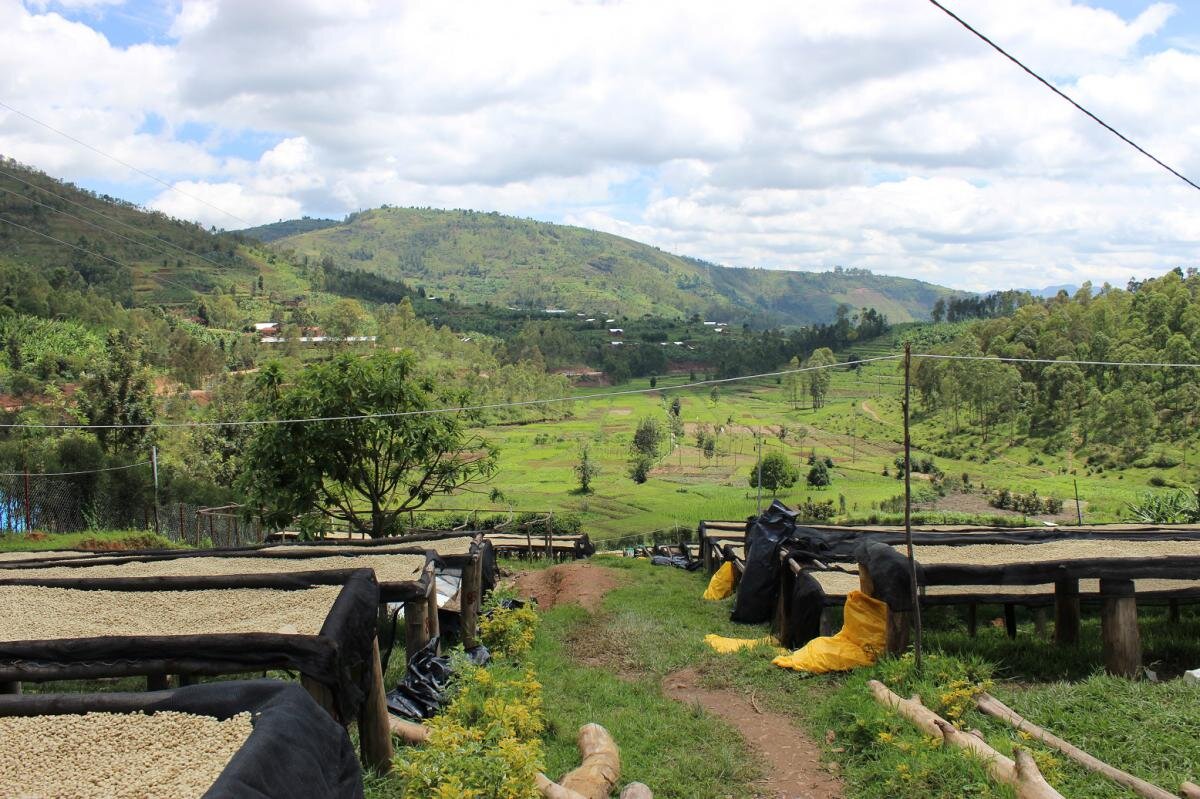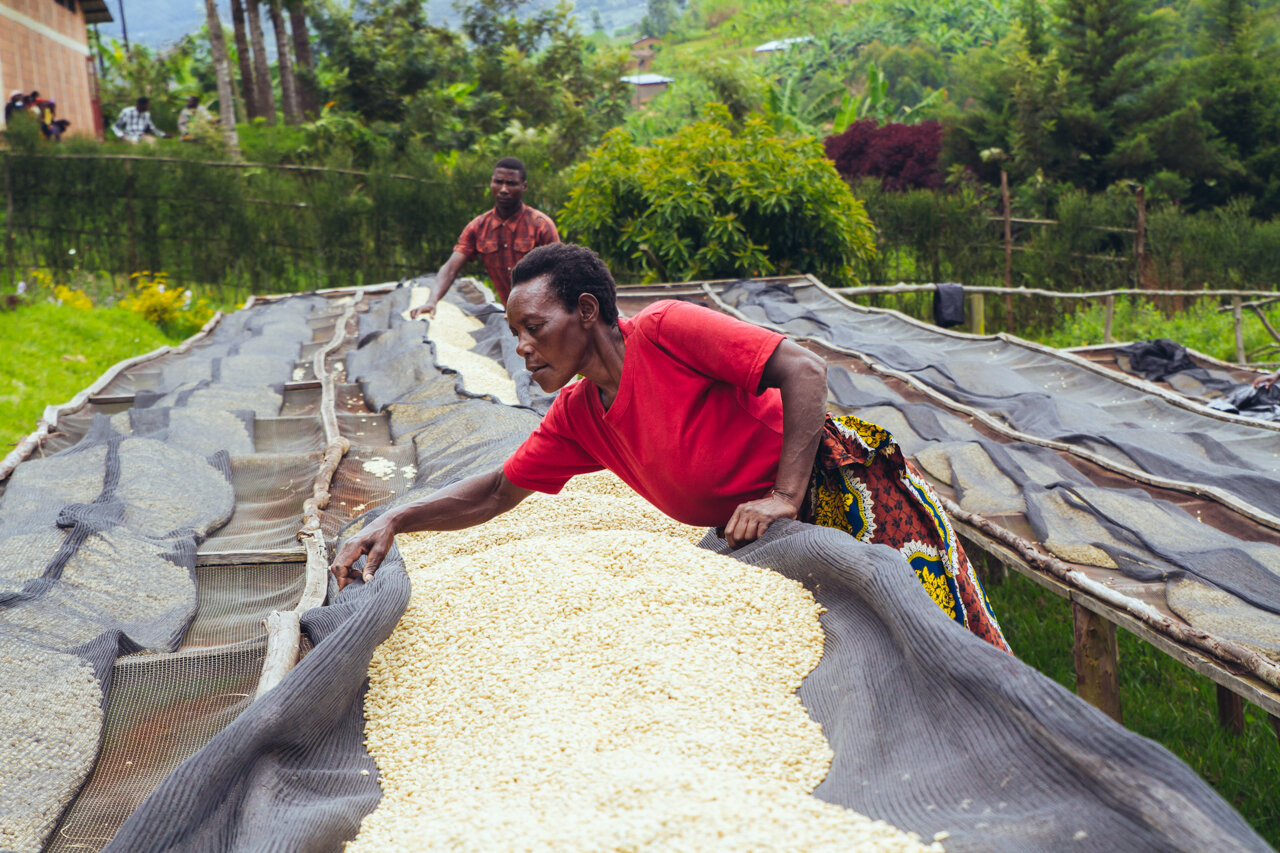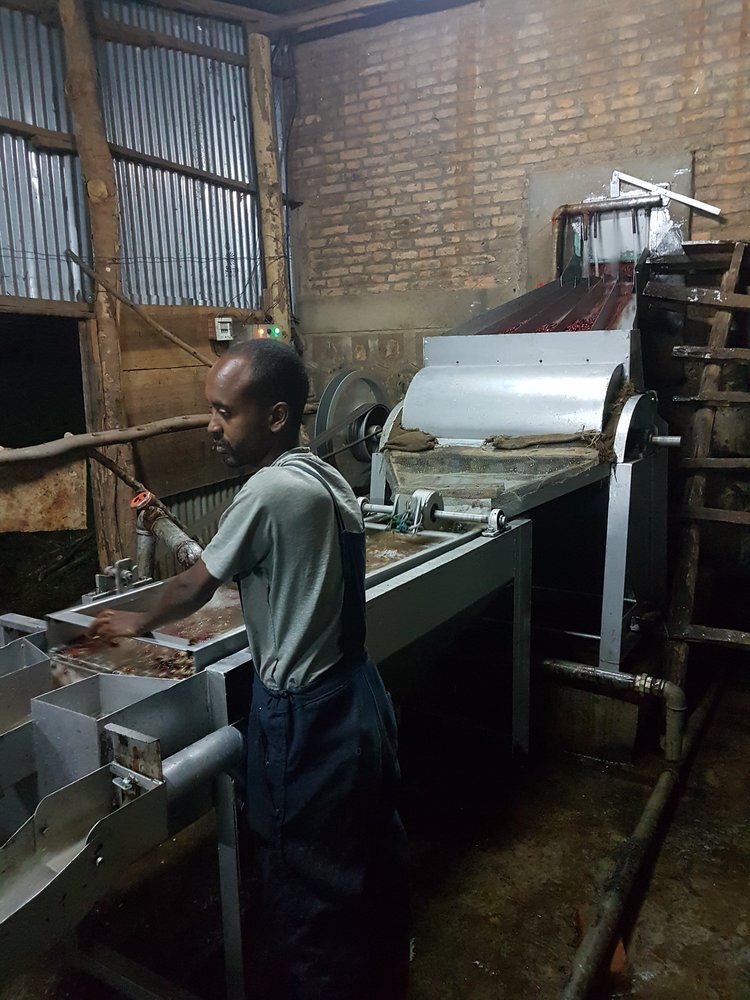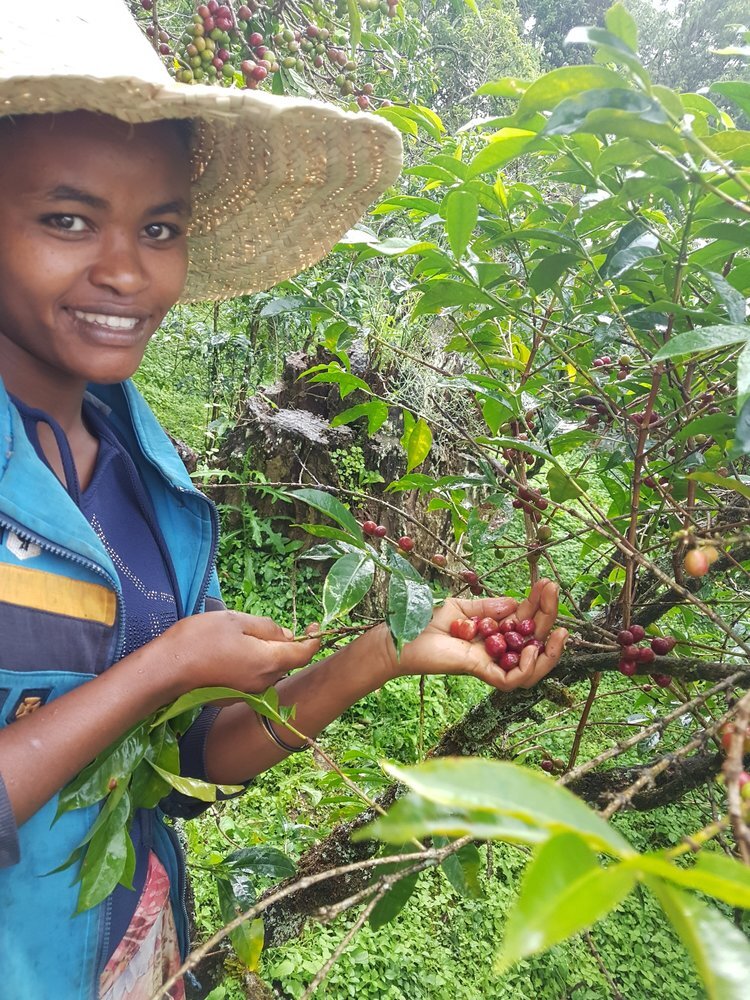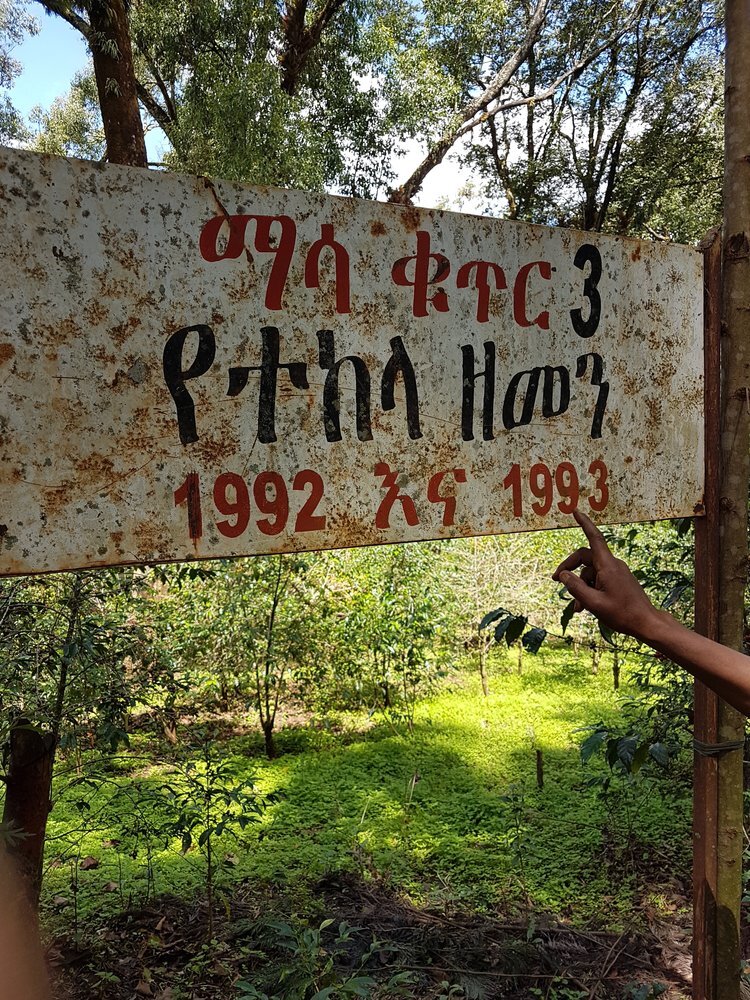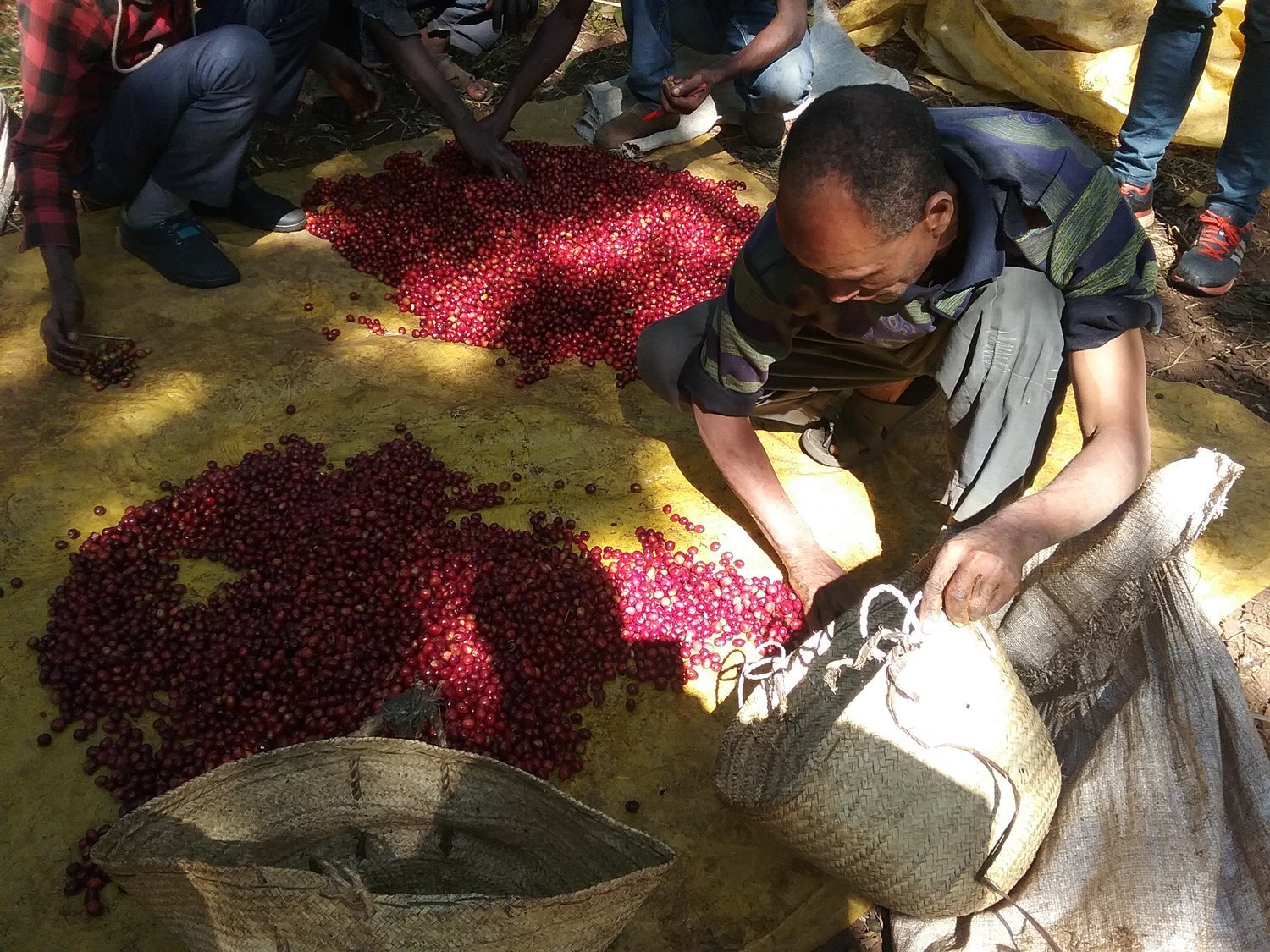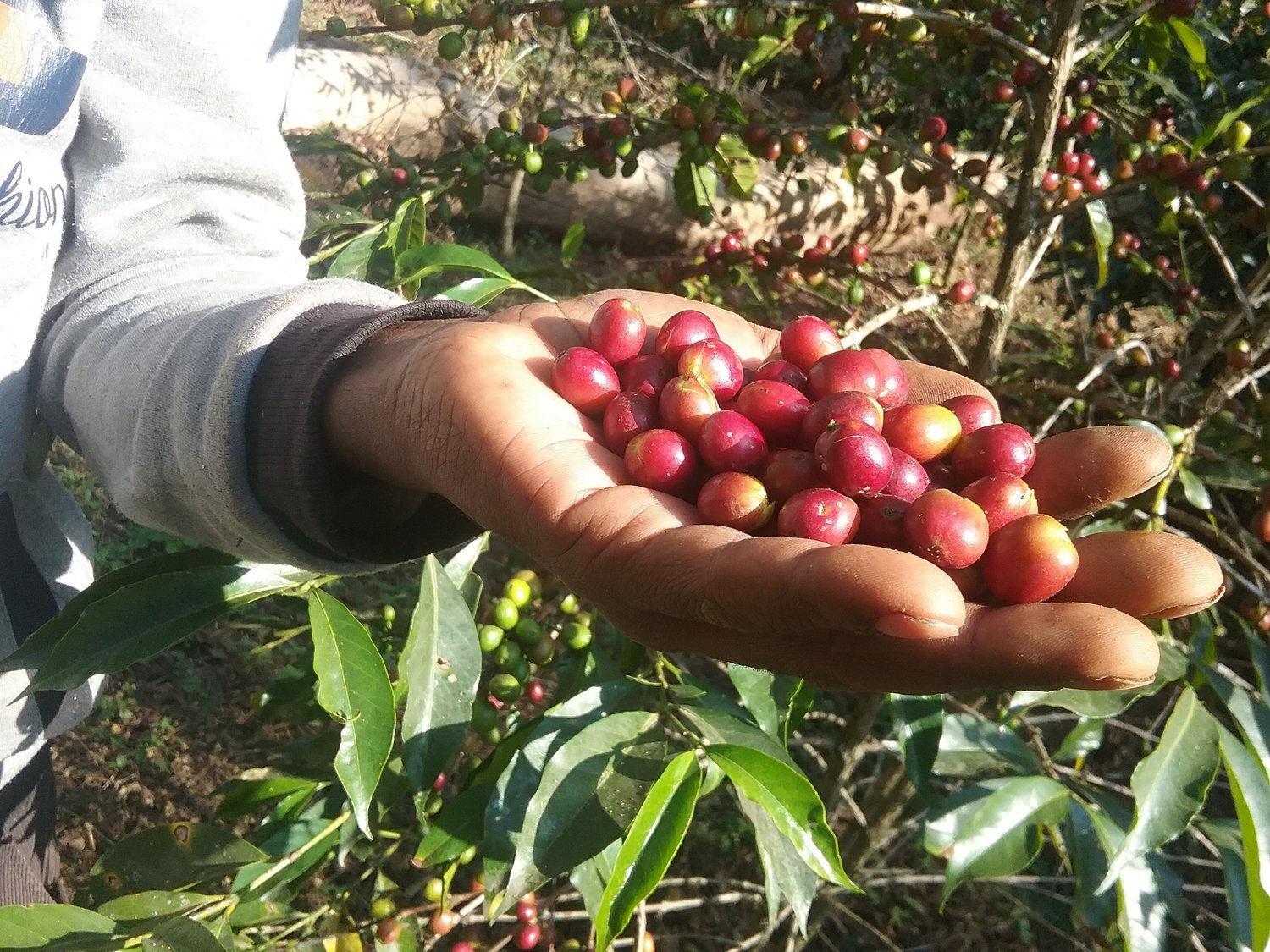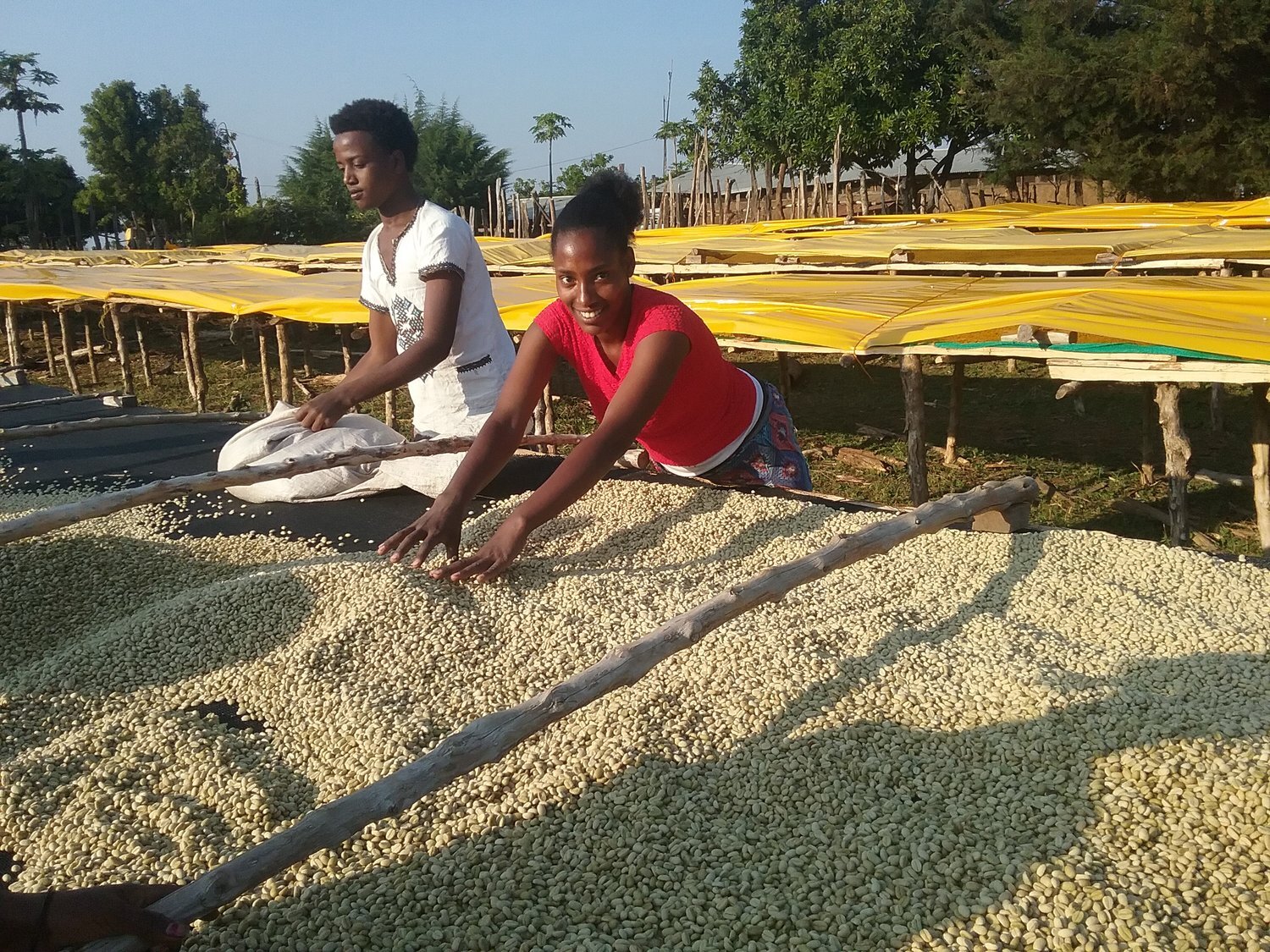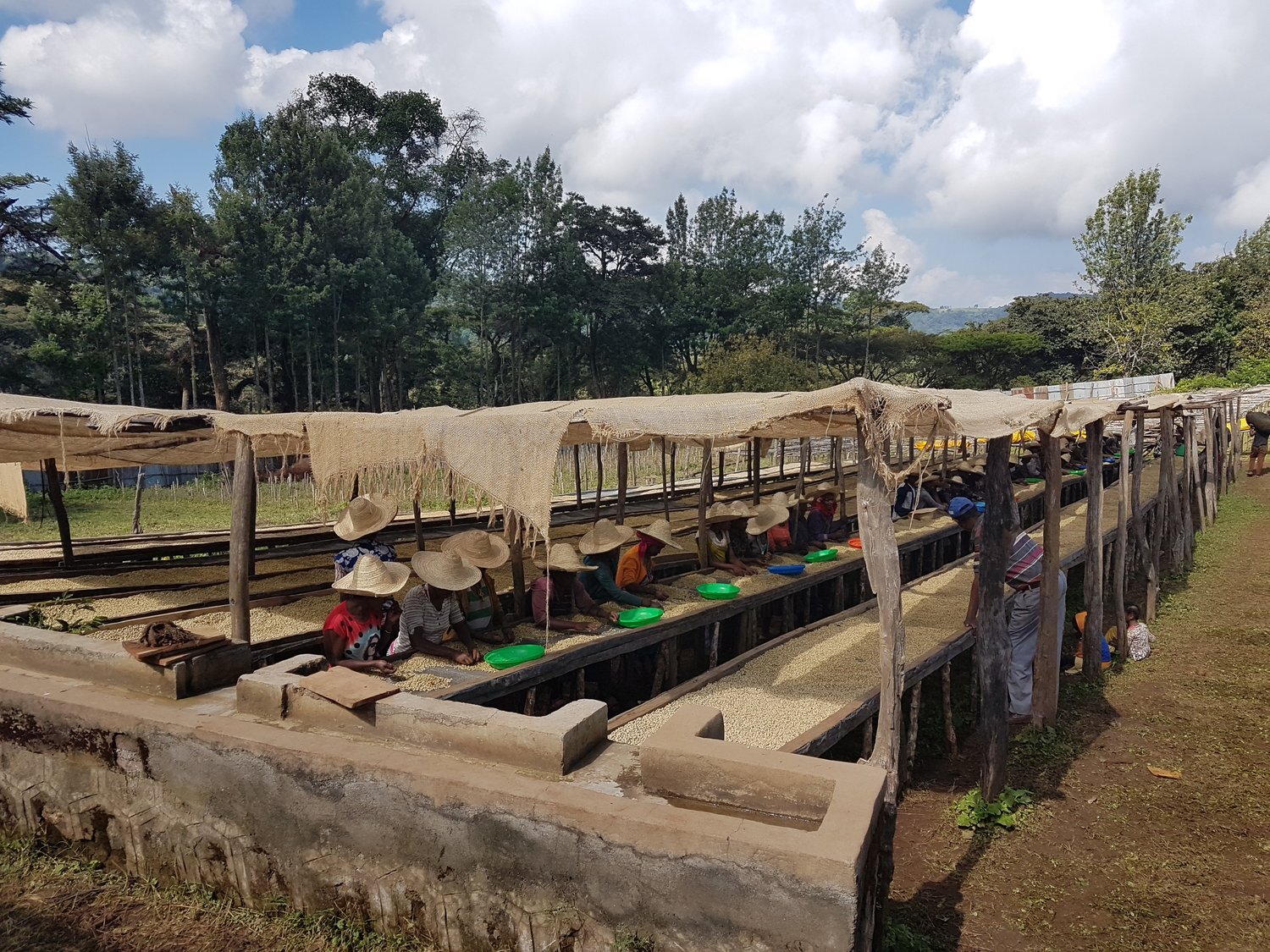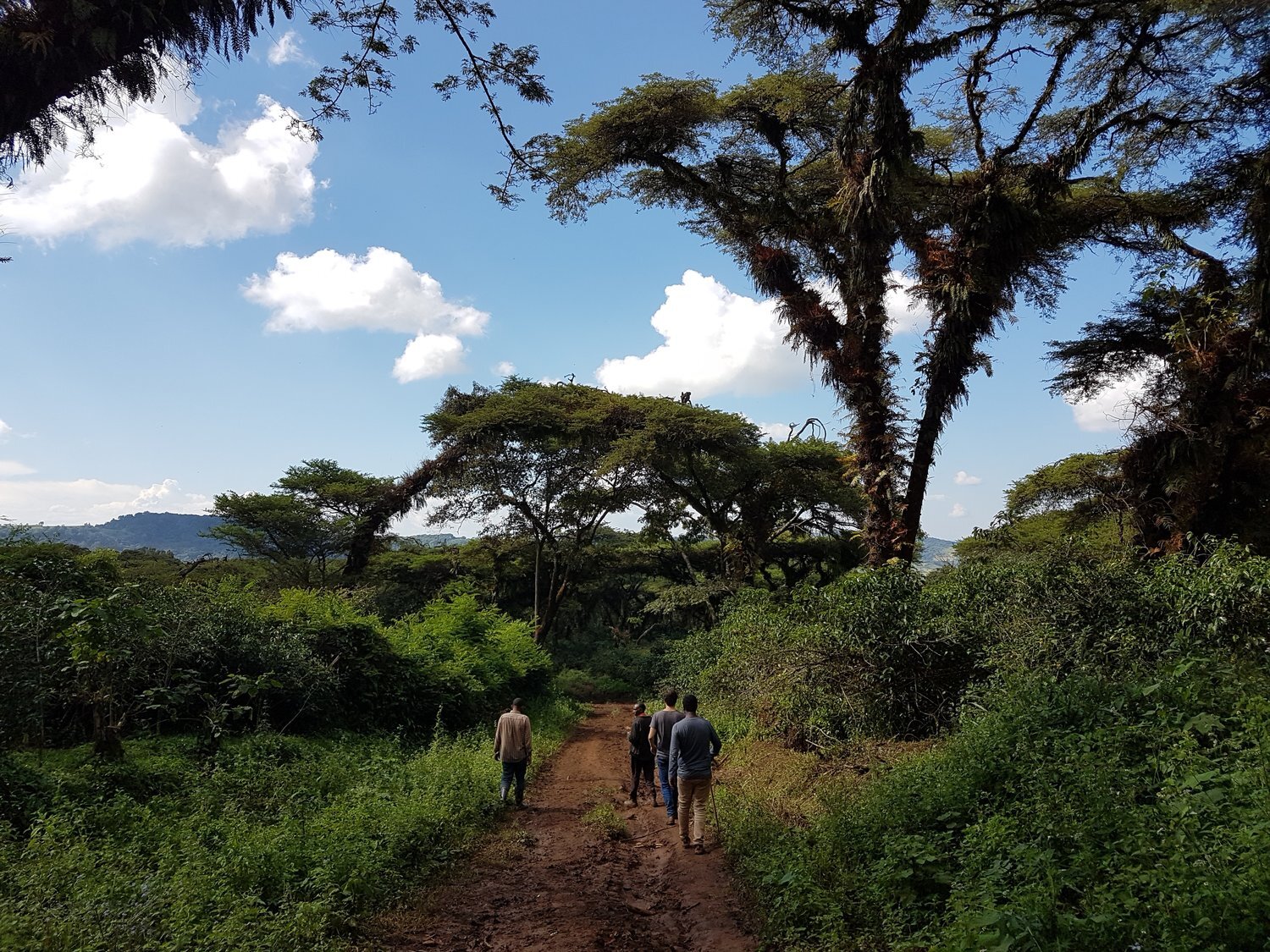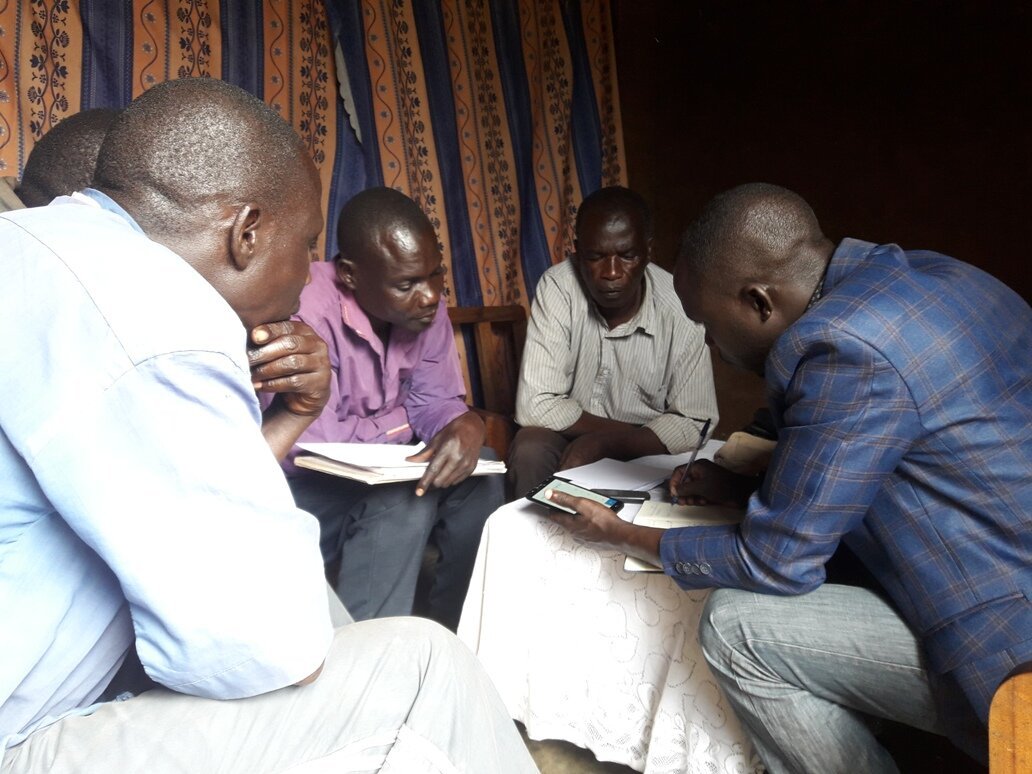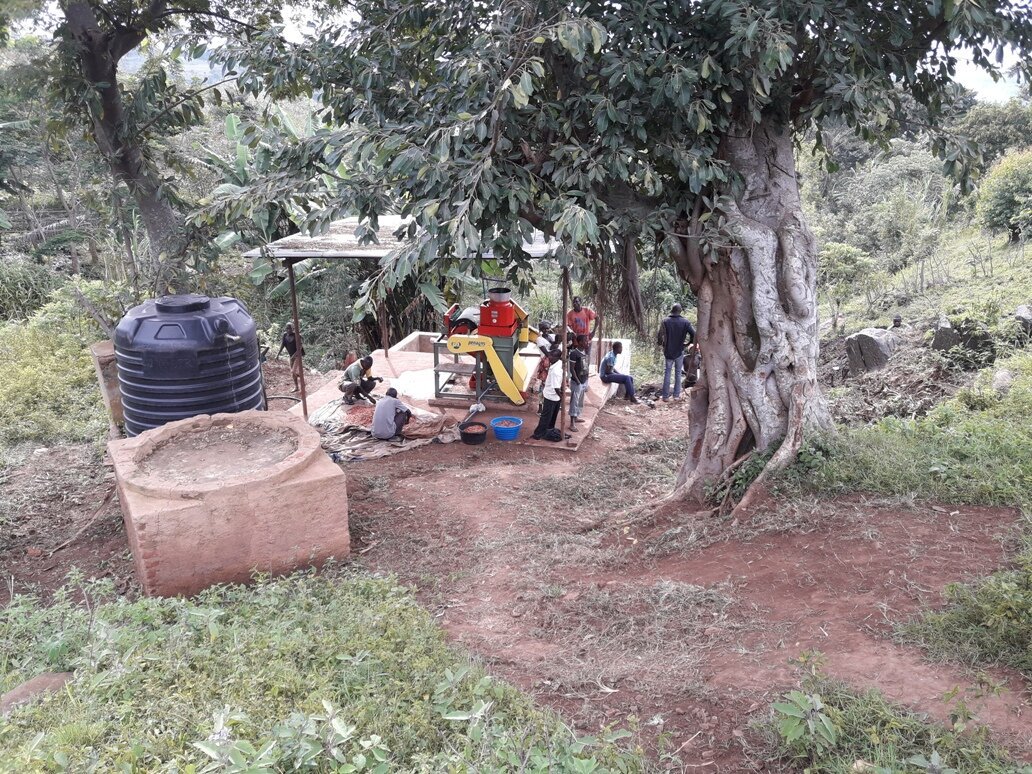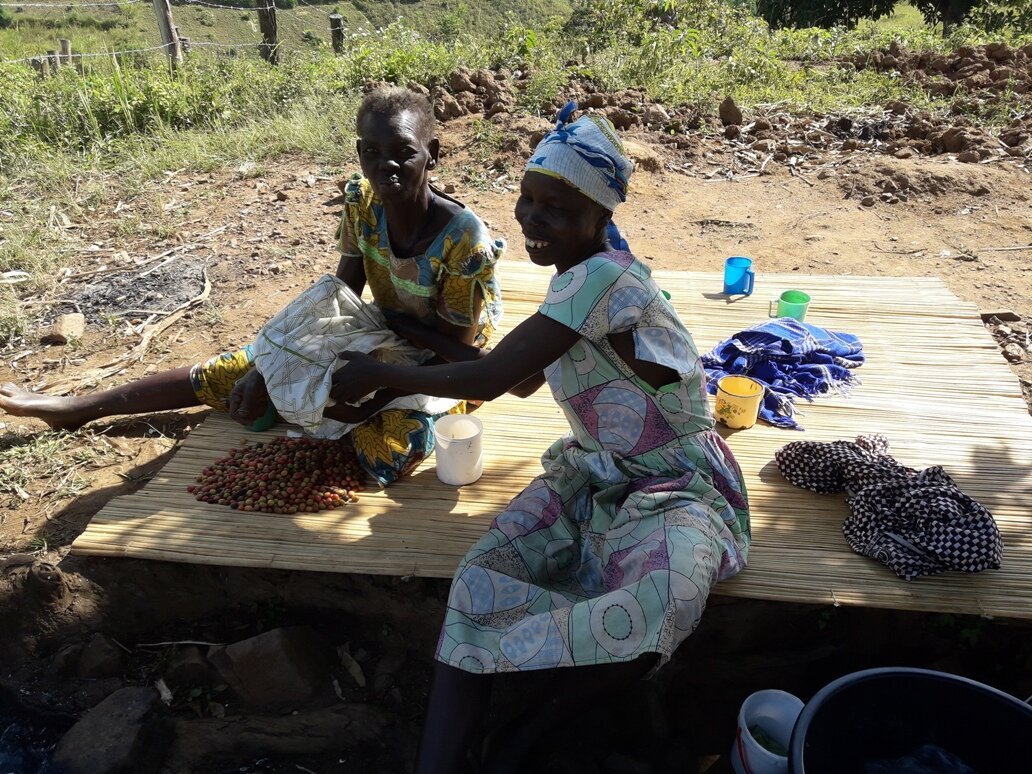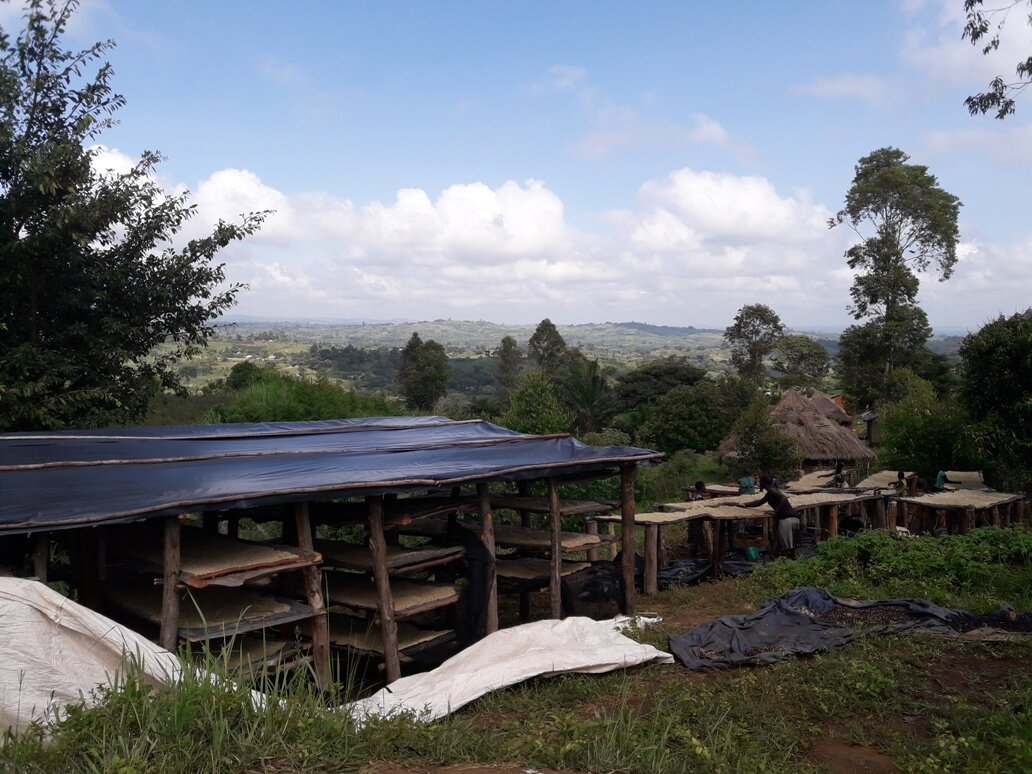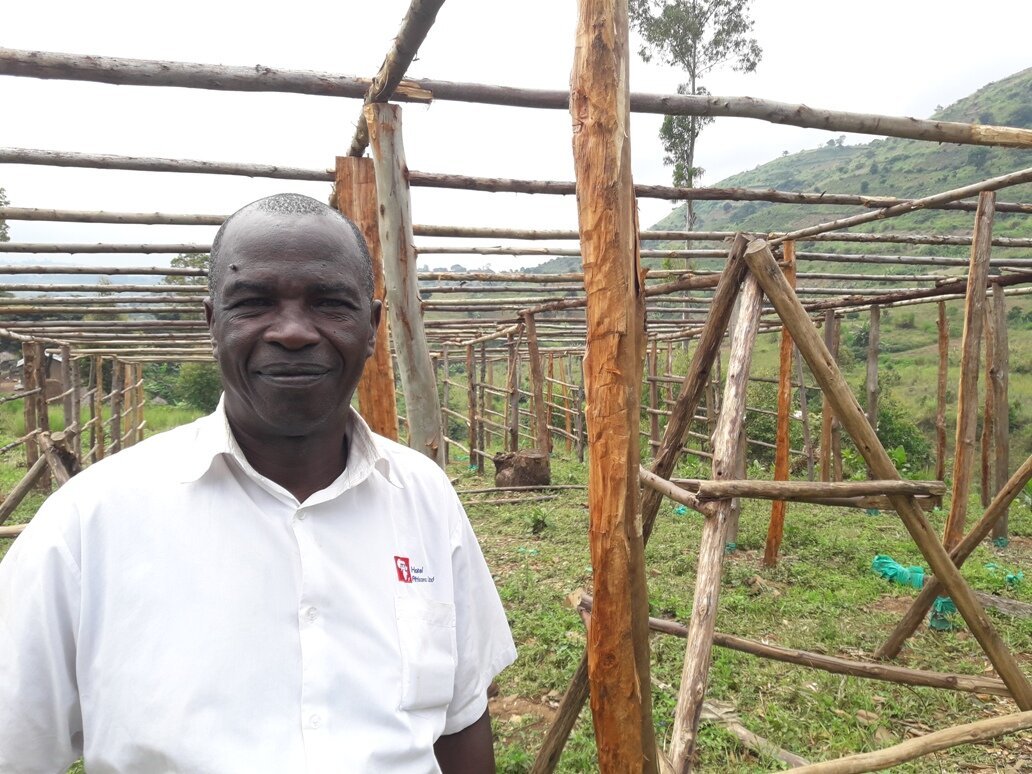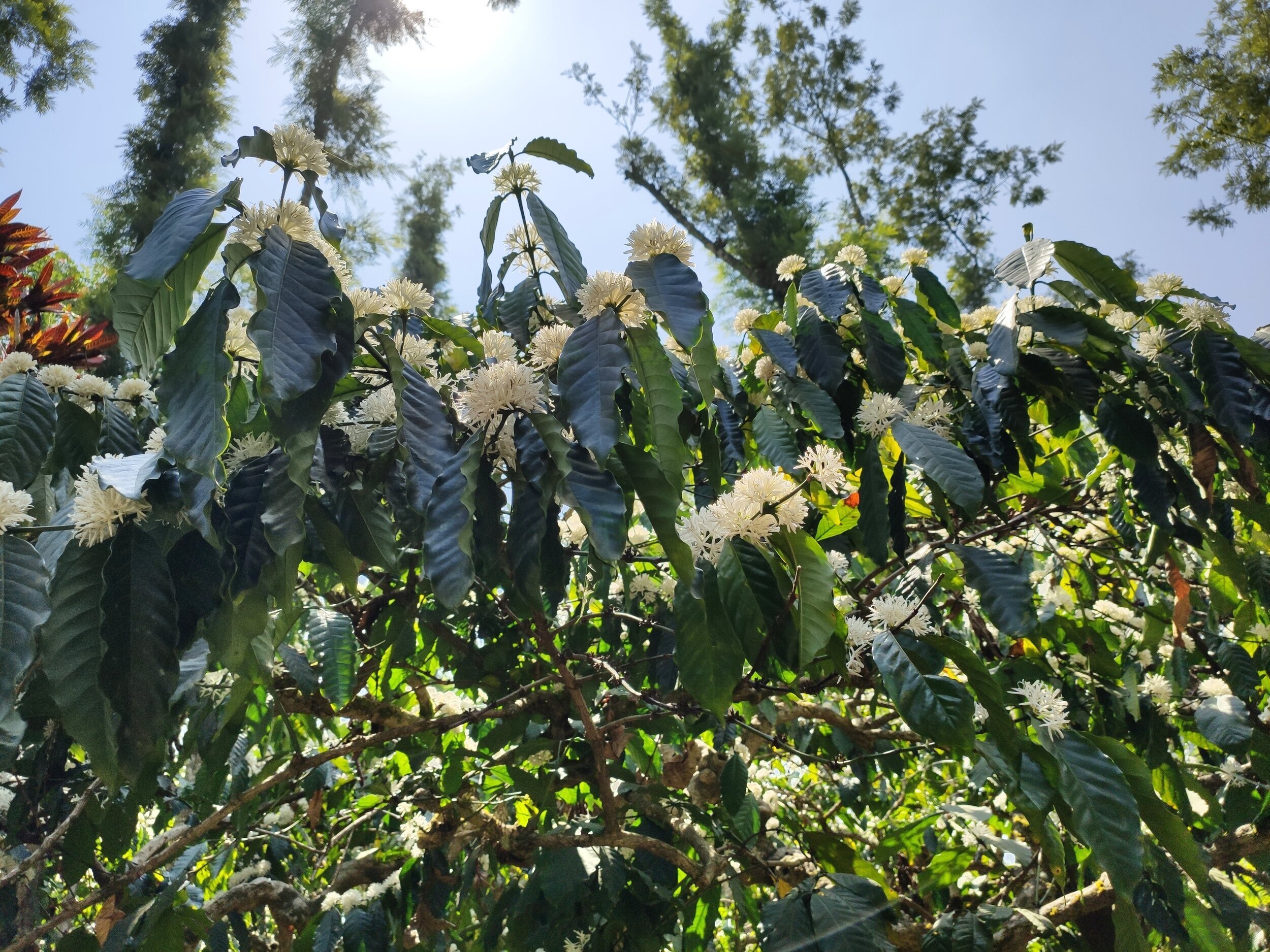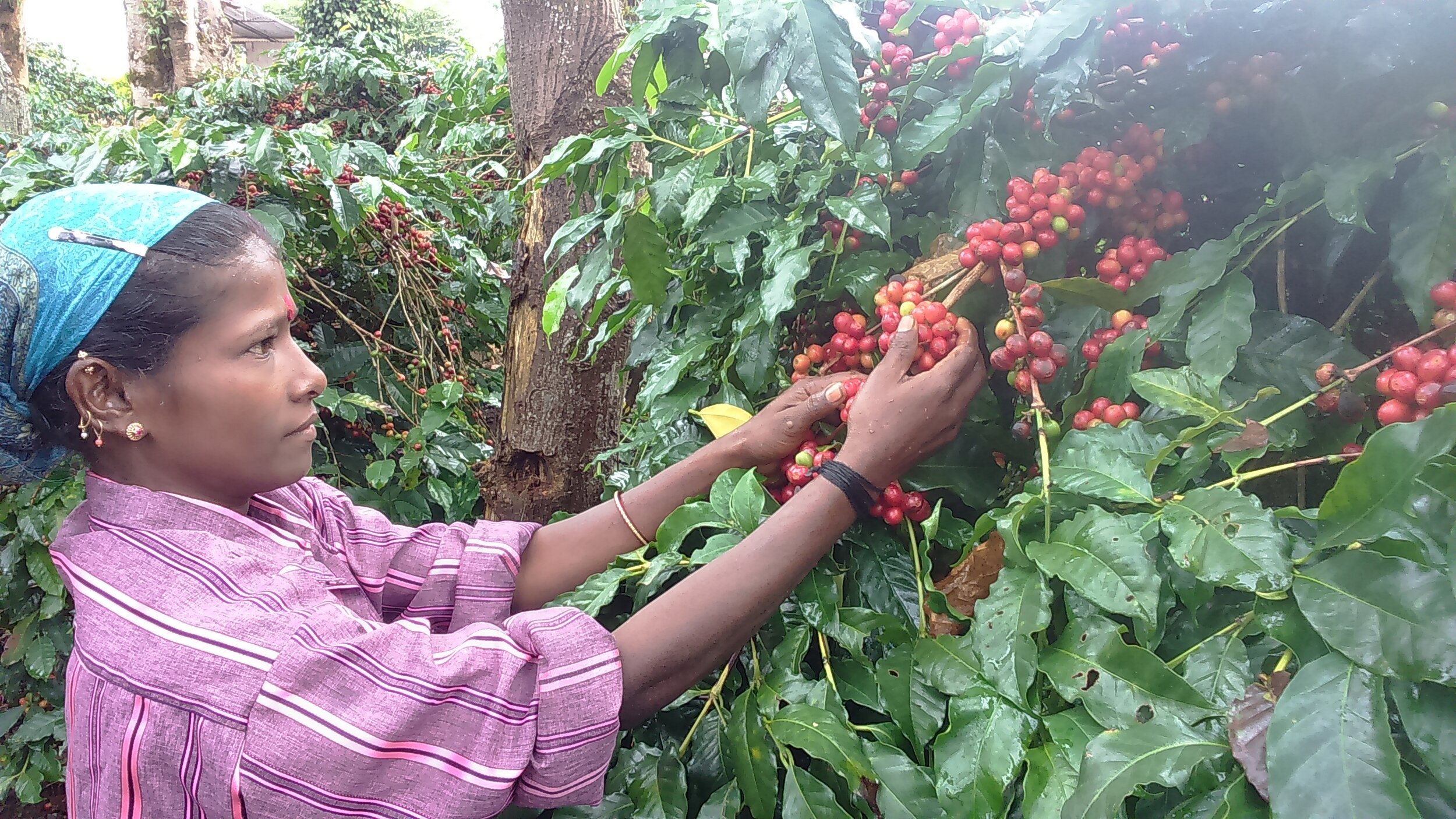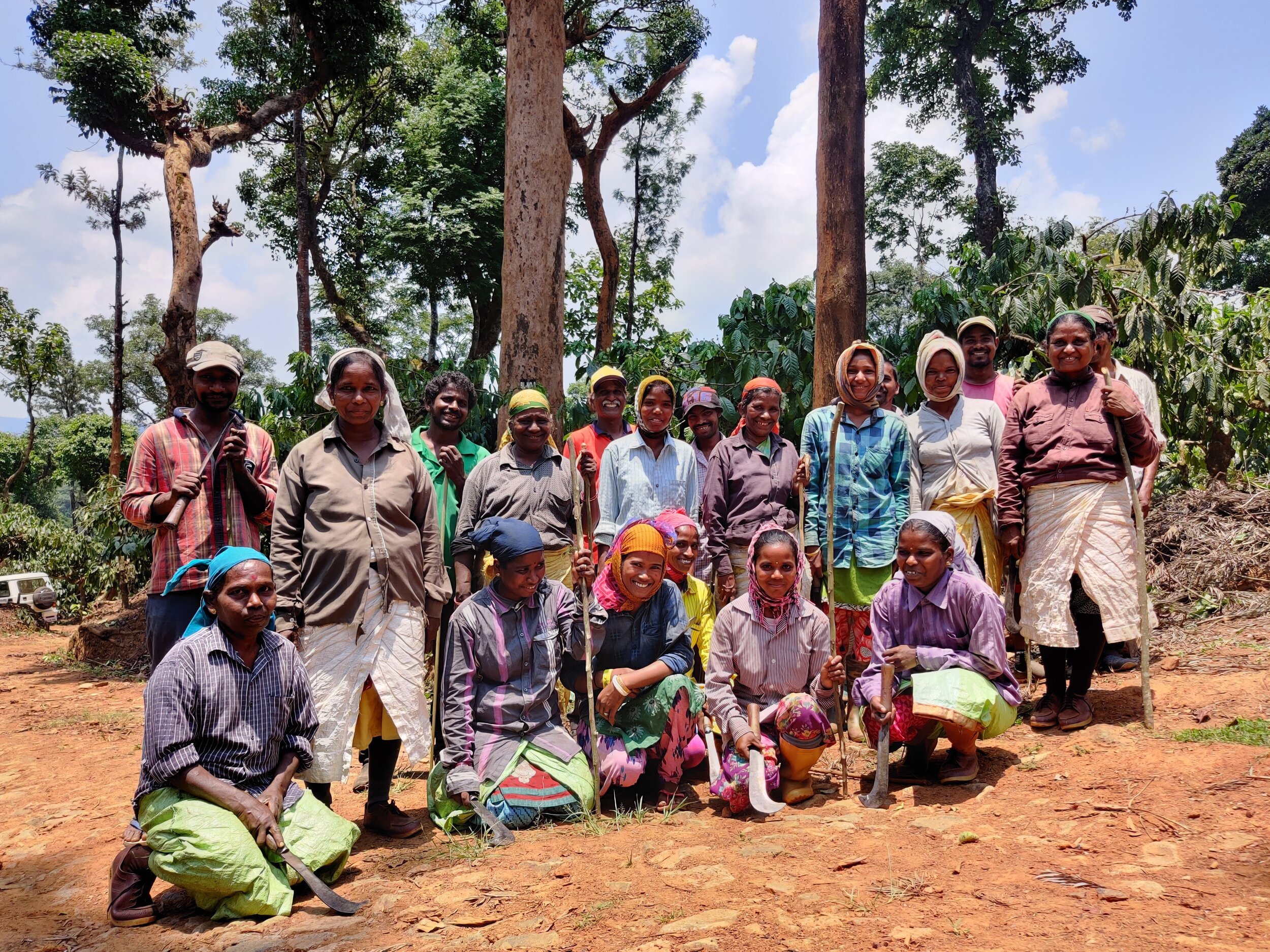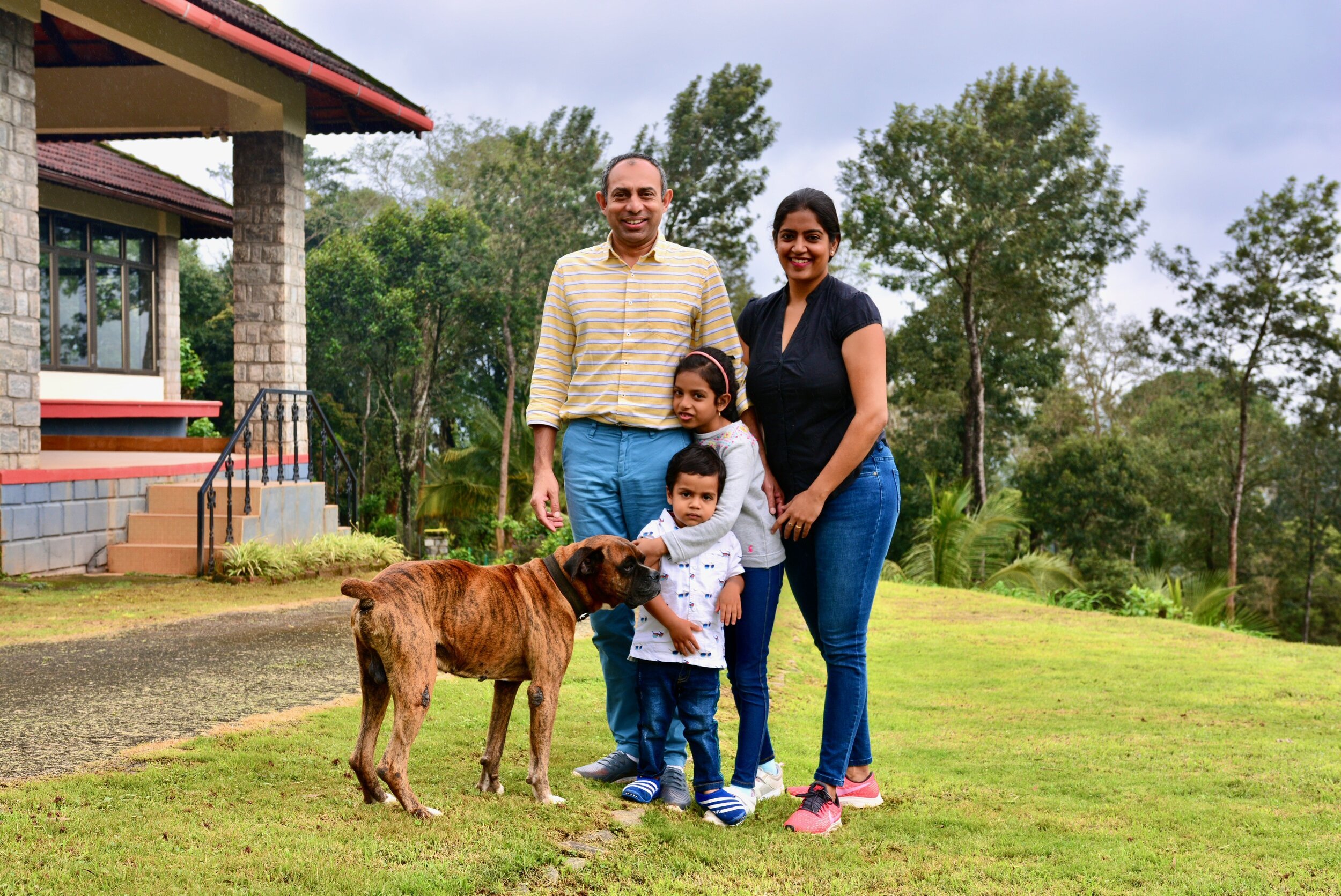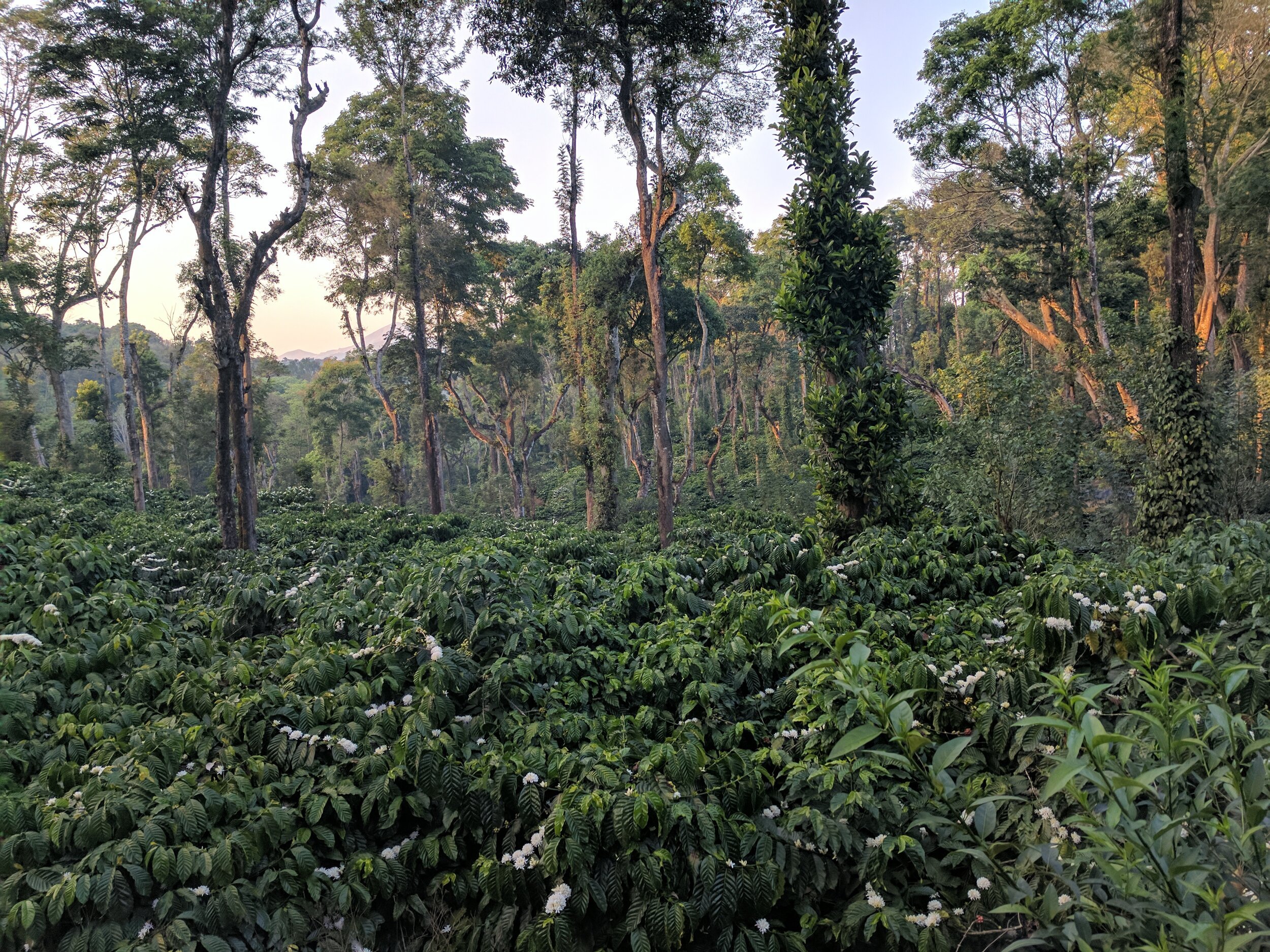We kunnen gerust stellen dat Rushashi een hoeksteen is geweest van het succes van This Side Up in de eerste jaren van ons bestaan. Onze levens zijn met elkaar verweven sinds we in 2013 begonnen met het transparant promoten van Rushashi en andere producenten (in Rwanda, maar al snel ook de rest van de wereld) vergelijkbare prijzen gingen eisen. Abakundakawa bestond toen nog niet zo lang. Vóór 2012 verwerkten de meeste boeren in het gebied traditioneel koffie thuis, maar sinds Antoine zijn positie als manager innam, zijn er veel dingen veranderd. Na het implementeren van kwaliteits- en verwerkingstechnieken, waarbij hij met name jonge mannen en vrouwen inspireerde om koffie anders te verwerken en te verbouwen, ontwikkelde Rushashi water- en energiebesparende fermentatiemethoden, geavanceerde pulprecyclingmethoden en twee organisaties voor empowerment van vrouwen. In 2015 werd de Ishema Youth Coffee Group geboren, waarvan wij trotse supporters zijn. Tegenwoordig investeert Rushashi in financiële onafhankelijkheid van plattelandsbanken door hun krediet- en spaarsystemen zorgvuldig te ontwikkelen en te beheren. Vanaf 2017 hebben we geïnvesteerd in een kwekerij voor schaduwbomen en andere planten die de koffie op een organische manier versterken. Momenteel voeren we agroforestry-proeven uit op een perceel vlak bij het Rushashi-wasstation en de eerste resultaten beginnen zichtbaar te worden.
Het regentschap Oost-Manggarai (ook bekend als Flores) is een van de armste regio's van Indonesië. ASNIKOM is een lokale coöperatie en produceert zowel Arabica- als Robusta-koffie. Voor de robusta heeft de coop diverse prijzen gewonnen en staat deze bekend als één van de beste en gebalanceerde ter wereld. Voor Robusta hanteren ze dezelfde normen en machines als voor Arabica, wat leidt tot een pittige, zeer volle Robusta die door het cafeïnegehalte aangenaam bitter is, zoet chocoladeachtig en zeer “clean” in de afdronk. Het is een robusta die duidelijk verandering kan brengen in de slechte reputatie die dit gewas heeft. De exporteur Adri van Ontosoroh verwerkt de koffies op het eiland Java tot de hoogste standaarden, met behulp van een kleusorteerder. Hierdoor worden alle laatste oneffenheden eruit gehaald, en worden de verschillende Indonesische koffies die This Side Up inkoopt hier geconsolideerd, om zo de logistieke kosten zo laag mogelijk te houden.
Limu Kossa werd opgericht door Giday Berhe. Hij begon zijn koffiecarrière als handelaar in 1993 in Jimma. Vervolgens opende hij een nat- en droogmolenstation met als doel de centrale koffiemarkt te voorzien van kwaliteitskoffie. Begin jaren 2000 besloot hij zijn eigen boerderij op te richten in het dorp Galeh in Jimma en vanaf het begin betekenisvolle relaties op te bouwen met naburige kleine producenten. Niet alleen besteedt hij een groot deel van zijn winst aan gezondheidszorg en scholing voor de gemeenschap, hij leert de boeren actief hun boerderijen en technieken te upgraden om uiteindelijk ook hun koffie tegen hoge premies te kunnen verwerken en exporteren. Zijn toewijding om kwaliteitskoffie te produceren en tegelijkertijd zijn lokale gemeenschap te ondersteunen, heeft hem zelfs de titel 'Abba Ollie' of 'hij die verheft' opgeleverd.
Zombo opereert anders dan elke andere waardeketen waarin we werken. Niet alleen zijn de boeren zelf eigenaar van de microstations (niet indirect via een coöperatie), maar ook de exporterende entiteit zal in 2028 voor 25% in handen van de boeren te zijn. Andy Carlton, een van de de oprichters, blijkt een beetje een ontwikkelingsgoeroe te zijn. Hij introduceerde microstations of micromolens in vele delen van Afrika (ook in CPNCK in Congo: Ngula, waar wij ook werken, is een van zijn creaties) naar Indonesisch voorbeeld - dit zijn kleine, betaalbare molens die niet door grote coöperaties of individuele boeren worden geëxploiteerd, maar door dorpen tot 200 personen. Als zodanig is Zombo een hybride van een particulier bedrijf, boerencoöperatie, maalstation, NGO en exporteur - wat een model!
Venkids Valley Estate wordt gerund door man en vrouw Pavan en Shilpa Nanjappa, die hun koffiereis in 2013 begonnen toen ze het landgoed van Pavan’s overleden vader erfden. Hun eerste oogst bedroeg slechts 480 kilo, maar ze benaderden de koffieteelt op een frisse manier. Ze telen zowel Arabica- als Robusta-variëteiten, zorgvuldig beplant met andere variëteiten. Het was vooral hun Robusta die onze aandacht trok: bij verschillende officiële cuppings op SCA-evenementen kon geen enkel jurylid niet vaststellen dat ze een Robusta proefden, waardoor de Nanjappa’s koffie werd verward met een moesson-Arabica. De boerderij in Venkids Valley herbergt meer dan 40 soorten junglebomen, waar de koffie in de schaduw wordt verbouwd. Er worden ook specerijen verbouwd zoals peper en kardemom, en fruit, waaronder sinaasappels en avocado's. Tussen de 50 en 60 soorten (trek-)vogels en een diversiteit aan wilde bijen zorgen voor evenwicht in het ecosysteem. De regio beschikt over vruchtbare grond, gevarieerde vegetatie en een uitgebalanceerd klimaat.
De Rwandese koffie is een gewassen arabica koffie. De combinatie van de hoogteligging en verwerking resulteert in een fris, citroenachtig en fruitig profiel, met veel zoetigheid en een vleugje zuurgraad. De Indonesische koffie is een ongewassen verwerkte Robusta, waardoor deze een zeer ronde, zoete en kruidige smaak heeft, zonder de hints van teer en rubber die zo vaak geassocieerd worden met deze koffiesoort. De Ethiopische koffie is een gewassen arabica, met een theeachtige body met hints van suikerriet en honing. Sinds juni 2022 toegevoegd hebben de Oegandese koffie een vergelijkbare smaak als de Rwandese koffie, en lijkt de Indiase koffie op de Indonesische koffie.
Met deze berekening hebben we voor de arabica-koffiesoorten (Rwanda, Ethiopië en Uganda) een Fairtrade-minimumprijs van $ 1,40/lbs, minus 25% + de toepasselijke Fair Trade-premie ($ 0,20/lbs) + de toepasselijke biologische premie per pond ($ 0,30/lbs) + de aanvullende RWS-premie ($0,30/lbs) = $1,85/lbs of €1,71/lbs oftewel €3,76/kg.
Voor de Robusta koffie (Indonesië en India) bedraagt de Fairtrade Minimumprijs $1,05/lbs, minus 25% + de toepasselijke Fair Trade Premium ($0,20/lbs) + de toepasselijke Biologische premie per pond ($0,30/lbs) + de aanvullende RWS-premie ($0,30/lbs) lbs) = $ 1,59/lbs of € 1,47/lbs oftewel €3,24/kg.
-
LIMMU KOSSA ESTATE
OOGST 2018/2019
Betaalde prijs (in contract) van $ 2,00/lbs voor ongewassen Arabica-koffie van klasse vier. Dit bedrag wordt rechtstreeks aan de estate betaald, die over een eigen exportvergunning beschikt. Omgerekend naar euro's is dit € 1,85/lbs of € 4,07 per kg wat ruimschoots voldoet aan de minimumprijs van RWS arabica.
OOGST 2020/2021
Na (helaas) een oogst te hebben overgeslagen vanwege de COVID-19-pandemie, kwam de handel in 2021 weer op gang. De boerderij had in het tussenjaar een solide koper uit de VS, waardoor de gevolgen van het onvermogen van TSU om tot aankoop over te gaan beperkt werden. De betaalde prijs (contractueel) was opnieuw $ 2,00/lbs voor ongewassen Arabica-koffie van klasse vier. Dit bedrag wordt rechtstreeks aan de estate betaald, die over een eigen exportvergunning beschikt. Omgerekend naar euro's is dit € 1,85/lbs of € 4,07 per kg, wat ruimschoots voldoet aan de minimumprijs van RWS arabica.
OOGST 2021/2022
De betaalde prijs (contractueel) was $ 2,20/lbs voor ongewassen Arabica-koffie van klasse vier. Dit bedrag wordt rechtstreeks aan de estate betaald, die over een eigen exportvergunning beschikt. Omgerekend naar euro's is dit € 2,04/lbs of € 4,48 per kg, wat ruimschoots voldoet aan de minimumprijs van RWS arabica.
SHEKA ESTATE
OOGST 2023/2024De betaalde prijs (contractueel) was $ 2,37/lbs voor ongewassen Arabica-koffie van klasse vier. Dit bedrag wordt rechtstreeks aan de estate betaald, die over een eigen exportvergunning beschikt. Omgerekend naar euro's is dit € 2,31 /lbs of €5,09 per kg, wat ruimschoots voldoet aan de minimumprijs van RWS arabica.
-
ABAKUNDAKAWA (COOP) MISOZI (EXPORTEUR)
HERBEBOSSINGSPROJECT 2020In 2020 betaalde This Side Up $ 9.435,00 voor een herbebossingsproject, uitgevoerd door agronomiebedrijf Bunga Bunga Ubutaka in 2019 en 2020. Het bestond uit de herbebossing van 11 hectare land dat eigendom was van de Abakundakawa-coöperatie, waar een volwaardig agroforestry-model werd geïmplementeerd. Dit modelplot dient als test- en inspiratieplot voor de leden van de coöperatie om koffie te verbouwen op een meer natuurinclusieve manier, en af te stappen van een “schone” monocultuurbenadering. This Side Up kocht 50 zakken van 60 kg (3000 kg) in het contract 2019/2020 en 320 zakken van 60 kg (19.200 kg) in het contract 2020/2021. $9.435,00 gedeeld door 3.000+19.200 kg = $0,42 per kg betaalde herbebossingspremie voor de boeren.
OOGST 2019/2020
Betaalde prijs (in contract) $3,20/kg voor oogst 2019 voor ongewassen Arabica-koffie van klasse A3. Dit contract omvat zowel de Abakundakawa-coöperatie die de exportdiensten van Misozi inhuurt (ook op contractbasis). Als we de premie van $ 0,42/kg erbij optellen, komt het bedrag uit op $ 3,62 per kg, of € 3,51 per kg.
Vanwege de vertragingen als gevolg van de COVID-19 pandemie in 2020 is deze koffie aangevuld met de high-end Rwandese speciaalkoffie van Roots Origin Ltd. - waarbij hierboven ook het inkoopcontract voor de oogst 2019 is gepresenteerd. De prijs die voor deze koffie wordt betaald bedraagt $7,10 per kg, of €6,57 per kg, wat veilig binnen de prijsmarges valt die zijn vastgelegd in het minimumprijskader van RWS arabica. De aanvulling van deze koffie duurt de laatste maanden van 2020, voordat de nieuwe oogst rond november 2020 arriveert.
OOGST 2020/2021
Betaalde prijs (in contract) $3,70/kg voor oogst 2020 voor natuurlijke Arabica-koffie van klasse A3. Dit contract omvat zowel de Abakundakawa-coöperatie die de exportdiensten van Misozi inhuurt (ook op contractbasis). Als we de premie van $0,42/kg erbij optellen, komt de betaalde prijs per kg uit op $4,12/kg. Dit komt neer op € 3,81 per kg.
OOGST 2021/2022
Betaalde prijs (in contract) $ 4,20/kg voor oogst 2021 voor natuurlijke Arabica-koffie van klasse A3. Dit contract omvat zowel de Abakundakawa-coöperatie die de exportdiensten van Misozi inhuurt (ook op contractbasis). Dit komt neer op € 3,89 per kg.
OOGST 2022/2023
Dit jaar zijn de prijzen, als gevolg van tekorten in de internationale koffiegemeenschap, maar vooral in de Centraal- en Oost-Afrikaanse regio, aanzienlijk gestegen tot $5,90/kg. Ook dit jaar zijn de logistieke kosten hoog en speelt de inflatie in ook de producerende landen een rol. Vanwege de tekorten werden de koffies aangevuld met de Rwandese koffies van het wasstation Roots Origin Intango, voor $ 5,50/kg. De euro is ingestort ten opzichte van de Amerikaanse dollar, de gemiddelde europrijs komt uit op € 5,45 per kg.
-
ASNIKOM (COOP) ONTOSOROH (EXPORTEUR)
OOGST 2019/2020
Betaalde prijs (in contract) IDR68.851/kg voor oogst 2019/2020, betaald aan Ontosoroh (verwerking en export) voor de ongewassen Flores Fine Robusta. In 2019 werd de IDR omgewisseld tegen een koers van € 1,00 voor IDR 15.203. De ASNIKOM-boeren verwerkten de koffie gedeeltelijk op Flores, het andere deel werd gedaan door Ontosoroh (de exporteur) op het eiland Java, voordat de koffie naar Nederland werd verscheept. Ontosoroh zorgde ook voor de exportvergunningen, vergoedingen en afhandeling. Afgaande op de wisselkoersen werd in 2019 €4,53 per kg betaald, waarmee duidelijk werd voldaan aan de minimumprijs van RWS Robusta.
OOGST 2020/2021
Het jaar daarop betaalden we IDR 76.261/kg voor de oogst 2020/2021. Dit jaar kocht € 1,00 IDR 16.446. Opnieuw hebben de ASNIKOM-boeren de koffie gedeeltelijk op Flores verwerkt; het andere deel, maar voornamelijk de selectie van bonen van hogere kwaliteit, werd gedaan door Ontosoroh (de exporteur) op het eiland Java, voordat de koffie werd verscheept. Ontosoroh zorgde ook voor de exportvergunningen, vergoedingen en afhandeling. Op basis van de wisselkoersen werd in 2020 €4,64 per kg betaald, wat de minimumprijs nog verder overschreed.
OOGST 2021/2022
Dit jaar zijn de boeren van ASNIKOM voorgefinancierd door onze partner en Stichting Progreso Foundation. Het betekende dat de boeren eerder hun loon kregen van de coöperatie. Normaal gesproken wordt een coöperatie betaald als de koffie het land verlaat, de boer krijgt het geld een paar weken later. Dit is al een flink aantal weken nadat hij zijn koffiebessen heeft afgeleverd, aangezien ze daarna het verwerkingsproces hebben doorlopen. Via Progreso krijgt de boer betaald op de dag dat hij of zij de koffie levert. Progreso kan deze dienst alleen in Amerikaanse dollars of euro's leveren. De prijs in het contract was daarom onafhankelijk van de lokale valuta en bedroeg €4,49 per kg.
OOGST 2022/2023
Ook dit jaar werden de boeren voorgefinancierd door de Nederlandse Stichting Progreso Foundation. De prijzen zijn dit seizoen gestegen naar €5,25/kg. Ook de volumes stegen, waardoor de impact in de lokale gemeenschap groter werd, zowel qua prijs als qua hoeveelheid.
OOGST 2023/2024
De prijzen, in lokale munt, zijn gelijk gebleven ten opzichte van vorig jaar. Aangezien de euro sterker werd ten opzichte van de Indonesische roepie, werd de prijs €5,02/kg. Wederom heeft Stichting Progreso Foundation een rol gespeeld in de voorfinanciering van de oogsten.
-
ZOMBO COFFEE PARTNERS
OOGST 2020/2021
Betaalde prijs (in contract) $1,40/lb voor oogst 2020 voor WUGAR CBD screen 15- koffie, omgerekend is dit €2,86/kg. Deze koffie werd samen met de Ambe Yellow Honey-koffie gebruikt, voor $ 2,80/lb, wat neerkomt op € 5,72/kg. Als we deze koffies voor hun respectievelijke deel in een verhouding van 50-50% gebruiken, komt dit neer op € 4,29 per kg.
OOGST 2021/2022
De prijzen stegen in 2021 als gevolg van de mondiale situatie, tot groot voordeel van de boer. De gemiddelde contractprijs steeg naar $3,33/lb, wat neerkomt op €6,80/kg.
OOGST 2022/2023
De gemiddelde contractprijs steeg naar $3,28/lb, wat neerkomt op 7,26 €/kg.
OOGST 2023/2024De gemiddelde contractprijs steeg naar $3,21/lb, wat door de verhoogde logistieke kosten en nieuwe wisselkoers neerkomt op €7,36/kg. Het verschil in wisselkoers tussen de dollar en de lokale valuta wordt verminderd, waardoor de prijsverschillen tussen de jaren worden verklaard.
-
VENKIDS VALLEY, MOOLEY MOONAH, KANBILE (ESTATE) SOUTH INDIA COFFEE COMPANY (EXPORTEUR)
OOGST 2020/2021
De South India Coffee Company verzorgt alle logistieke bewegingen tot aan de Rotterdamse haven. In officiële termen heet dit een CIF-contract. Betaalde prijs (contractueel) $5,55 CIF per kg betaald voor de Venkids Valley koffie. De prijs die aan boeren wordt betaald bedraagt $4,00/kg, wat neerkomt op €3,70 per kg.
OOGST 2021/2022
In post-COVID-tijden namen de volumes toe, dus heeft de South India Company twee andere ultramoderne estates in de regio opgenomen, met een zeer vergelijkbaar profiel wat betreft smaak, prijs en ecologische en sociale impact. De prijs die aan boeren wordt betaald bedraagt $5,83/kg voor de koffiesoorten Venkids Valley, Mooley Moonah en Kanbile Estate, inclusief logistieke kosten van €0,85/kg. De boerenprijs komt uit op € 4,63 per kg.
OOGST 2023/2024
De prijzen stegen als gevolg van de mondiale situatie, tot groot voordeel van de boer. Ook logistieke kosten namen toe, door langere reistijden door het Suez kanaal conflict. De gemiddelde contractprijs steeg naar 2,42 /lb, wat neerkomt op €5,44/kg.
Veel partijen claimen duurzaam te zijn, en doen “impact projecten” om zo hun negatieve impact te verdoezelen en de aandacht af te leiden. Bij This Side Up betalen we goede prijzen, en hier zijn we trots op. We laten het dus ook graag zien. Zie hieronder de koopcontracten die we hebben gesloten met onze partners in de koffieproducerende landen. We werken op basis van goed overleg met de producenten, op basis van gelijkwaardig ondernemerschap en gestoeld op hun productiekosten plus een winstmarge, en betalen deze prijs. We zetten deze af tegen zowel de Wereldmarktprijs alsmede de Fairtrade prijs, om te illustreren wat dit concreet betekent.
Auteursrecht op afbeeldingen. Raadpleeg This Side Up Coffees als u de foto's voor commerciële en niet-commerciële doeleinden wilt gebruiken.
WAAR: Flores, Indonesië
WAT: Het opzetten van een agroforestrysysteem om de koffieopbrengst te verbeteren en alternatieve inkomstenbronnen te bieden aan boeren op Flores.
WIE: 100 boeren uit Flores, Indonesië, This Side Up, MVO, Asnikom, Pretaterra, CCF en Progreso.
WAAR: Nicaragua, Peru, Colombia, Brazilië, Rwanda, Ethiopië, Oeganda, DR Congo, Kenia, Tanzania, Myanmar, India, Sri Lanka, Thailand en Indonesië.
WAT: Het bieden van een extra en blijvende investeringsprikkel voor onze partnerproducenten in regeneratieve landbouw.
WIE: Alle oorsprongspartners van This Side Up.
WAAR: Rende Nao, Manggarai, Flores, Indonesië; Amsterdam, Nederland; Barcelona, Spanje
WAT: Het creëren van de allereerste modecollectie ontworpen op de oorsprongslocatie.
WIE: Sylvia Calvo (Sylvia Calvo BCN), Adri Yahdiyan (Ontosoroh Coffee), This Side Up Coffees.
WAAR: Abakundakawa Rushashi, District Gakenke – Noordelijke Provincie, Rwanda
WAT: Het creëren van een agroforestry-proefperceel om het potentieel van een intercroppingsysteem te testen en demonstreren aan niet-gecertificeerde koffieboeren.
WIE: Abakundakawa Rushashi (coöperatie), This Side Up (financier), MVO Nederland (financier), Matthew Gates (agronoom).
-
RWANDA
Langste samenwerking waar This Side Up bij betrokken is geweest, en blijft daarmee voortbouwen op sterke vriendschapsbanden.
Sinds de genocide van 1994 zijn veel vrouwen succesvolle ondernemers geworden. Het wasstation van Rushashi wordt gerund door een vrouwelijk bestuur.
De verkoop van de Abakundakawa-koffie stagneerde, als gevolg van de RWS-blend exporteert de gemeenschap nu twee keer zoveel.
In 2020 startte This Side Up samen met MVO Nederland en de coöperatie Abakundakawa een herbebossingsproject om de start te initiëren van een volwaardig agroforestry-systeem. Lees hier meer over het project.
ETHIOPIË
De oorsprong van koffie ligt in Ethiopië, hoewel het een van de armste landen ter wereld is, waar nog steeds 30% van de bevolking onder de armoedegrens leeft. Het tot stand brengen van stabiele handelsbetrekkingen heeft een enorme impact op het levensonderhoud van de boeren en op het behoud van de grote verscheidenheid aan koffieplanten.
De koffie van het Limmu Kossa Estate wordt verbouwd in een tropisch regenwoud – een functionerend agroforestry-systeem. Dit willen wij graag behouden en dat doen wij door een goede prijs voor de koffie te betalen.
INDONESIË
De provincie Oost-Nusa Tenggara, waartoe Flores behoort, wordt door de VN aangemerkt als de provincie die de komende decennia het zwaarst getroffen zal worden door de klimaatverandering. In plaats van erop te wachten, ruilen we de zwakkere arabica in voor de veerkrachtigere robusta koffievariant.
Robusta heeft het stigma dat het van lage kwaliteit is, een laag inkomen heeft voor de producenten, en wordt vaak geassocieerd met oploskoffie. Wij produceren Robusta van hoge kwaliteit voor een scherpe prijs, gecombineerd met een langetermijncontract. Als zodanig is het een klimaatadaptieve koffie, klaar voor de toekomst.
De provincie Oost-Nusa Tenggara is een van de armste provincies van het land, en als zodanig is het zinvol om te investeren in het eiland Flores en je te concentreren op de inhaalslag ervan – op economisch, sociaal en ecologisch gebied.
ASNIKOM heeft een prijs gewonnen voor het produceren van koffie van extreem hoge kwaliteit.
UGANDA
Zombo werkt met een concept genaamd koffiemicrostations. Dit zijn miniatuur centrale koffiewasstations die door een kleine groep boeren kunnen worden gebouwd en beheerd, met een minimum aan externe steun.
De komende jaren zal er voor deze blend meer koffie uit het Gonyobendo microstation komen. Gonyobendo is de grootste van de 10 Zombo Coffee Partner-microstations, koopt bij meer dan 300 boeren en produceert elk seizoen meer dan 30 ton perkamentkoffie. Het Gonyobendo-team produceert volledig gewassen koffie met behulp van een tweetraps Penagos-pulper. Het kernmanagementteam is een gezin onder leiding van Charles, met zijn jongere broers Alex, Collins en Alfred.
Uganda staat al bekend om zijn uitstekende Robusta-koffie. De afgelopen jaren is Uganda begonnen een tweede reputatie op te bouwen, als herkomst van fijne arabicakoffie. Vruchtbare grond, vulkanische gronden, overvloedige regenval en zonneschijn, goede variëteiten, diverse gebieden met geschikte microklimaten en hoogten, dit alles in combinatie met verbeterde productiepraktijken draagt bij aan deze opkomende oorsprong van zeer goede specialty koffie. De Zombo-regio, de Alur Highlands, is voor de meeste koffieliefhebbers een blinde vlek op de kaart. Het ligt aan de westelijke oever van de Nijl, de rivier die Lake Albert verlaat en zijn lange, kronkelende reis naar de Middellandse Zee begint.
INDIA
Venkids Valley behandelt hun koffieschillen (na het verwerken van de koffie blijft dit over) met rietsuiker (een soort muscovado-suiker die veel voorkomt in India) en mest om de bacteriën te helpen de schil snel te verteren. Deze zelfgefermenteerde meststof passen ze in september toe op hun koffie, paprika en avocado's. Ze gebruiken ook neemcake als natuurlijke meststof en pesticide en hebben vier tanks om koffieafvalwater op te slaan dat ze behandelen met culturen en later gebruiken om de peper en arecanoot water te geven.
Indiase koffie staat al heel lang op ons verlanglijstje vanwege een ongelooflijke mix van eigenschappen die nergens anders te vinden zijn: pure bossystemen, geavanceerde verwerkingskennis, een passie voor het ontwikkelen van niet alleen de specialiteit Arabica maar ook Robusta - gecombineerd met integriteit, ethiek en extreme zakelijke efficiëntie. Je vraagt je af waarom dit land niet bij elke koffiebrander bovenaan de agenda staat.
Adri Yahdiyan
adri@ontosoroh.co.id
+62 857 4385 9181
Andy Carlton
andy@zombocoffee.com
+256 787 251280
Gidey Berhe Retta
limmukossa1@gmail.com
+251 917 550 244
Antoine Kagenza
abakundakawarushashi@yahoo.fr
+250 7 8328 8732
Komal and Akshay Dashrath
komal@sicc.coffee
+91 99701 98003






































